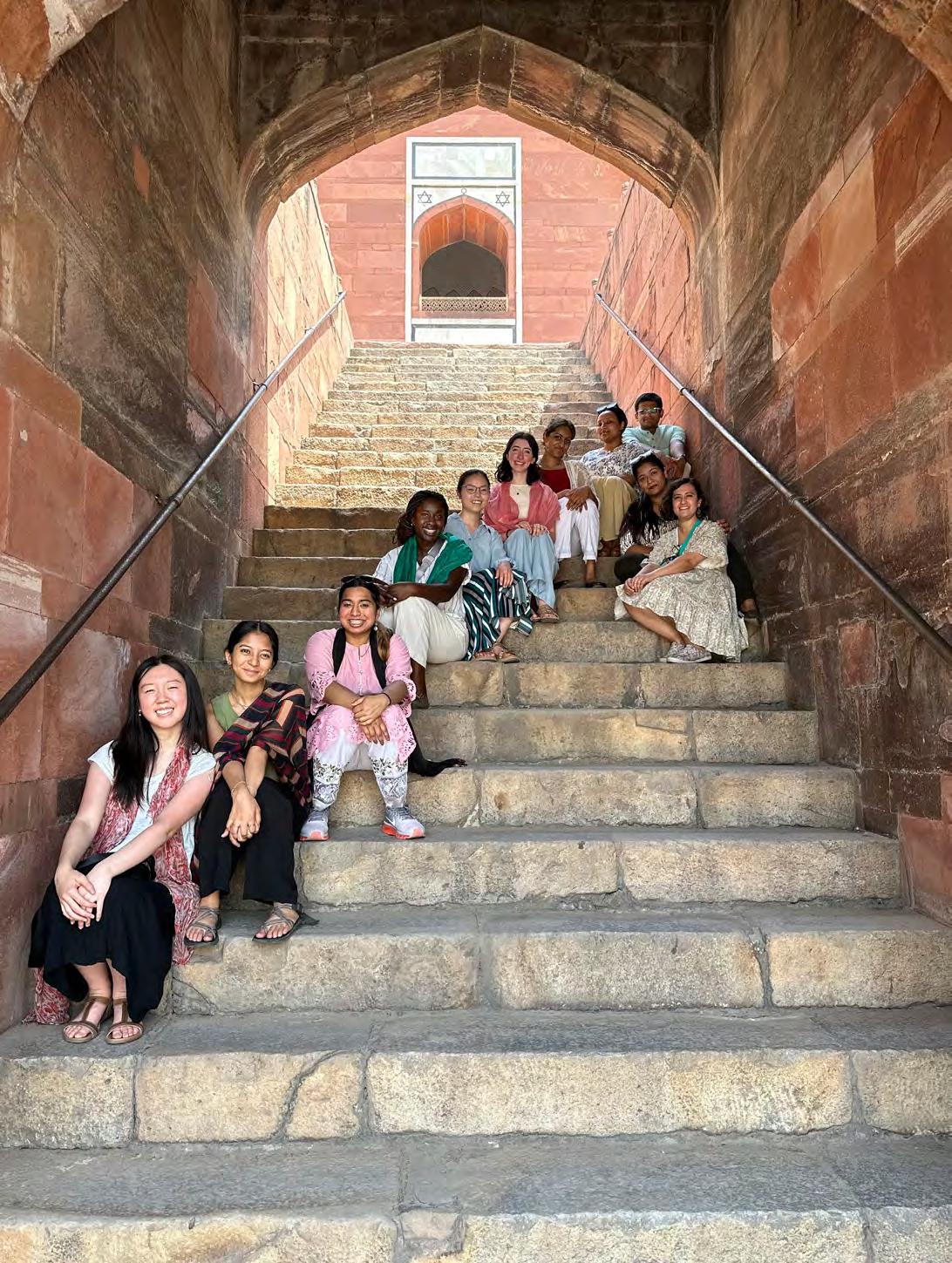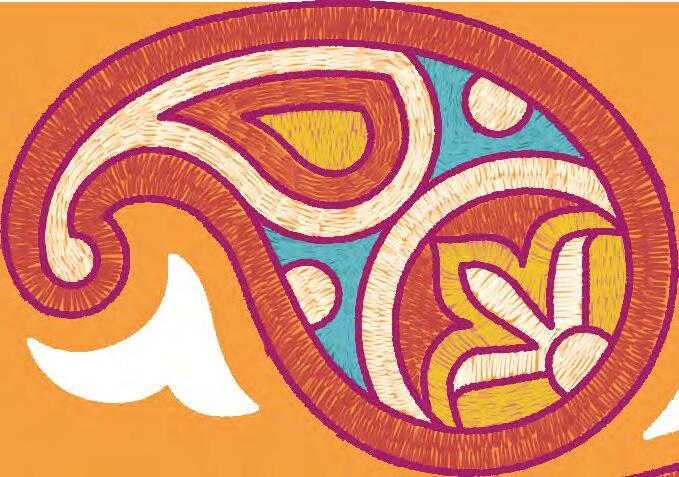





Center for the Advanced Study of India
Ronald O. Perelman Center for Political Science & Economics
University of Pennsylvania
133 South 36th Street, Suite 230
Philadelphia, PA 19104-6215
Telephone: +1 (215) 898-6247
Website: casi.sas.upenn.edu







Ronald O. Perelman Center for Political Science & Economics
University of Pennsylvania
133 South 36th Street, Suite 230
Philadelphia, PA 19104-6215
Telephone: +1 (215) 898-6247
Website: casi.sas.upenn.edu

Founded in 1992, the Center for the Advanced Study of India at the University of Pennsylvania is the first research institution in the United States dedicated to the study of contemporary India. A national resource, it fills an urgent need for objective knowledge of India’s politics, rapidly changing economy, and social transformations.
The Center seeks to enrich our understanding of contemporary India by conducting datadriven, policy-oriented research on India’s most pressing challenges, convening discussions with scholars, policymakers, and practitioners on key issues, hosting distinguished and new voices from India at Penn, and providing opportunities for new generations of students and scholars to conduct research and hold internships in India.

Tariq Thachil CASI Director, Professor of Political Science, Madan Lal Sobti Professor for the Study of Contemporary India, University of Pennsylvania

We are delighted to present our fourth Annual Report to you, in our Center’s 32nd year, and my final year as Director.
This year was a fulfilling culmination of many of our efforts over the past five years. When I began my tenure, the world was still reeling from the early months of the pandemic. The specific challenges facing CASI were also acute, given the constraints the pandemic imposed on our core activities: research, events, visitor exchange, and student internships. The magnitude of the crisis in India, in terms of lives lost, families impoverished, and communities disrupted, also deeply and often directly impacted our Center’s community.
But amidst those unprecedented challenges, the pandemic also afforded us an opportunity to rethink the kinds of communities CASI could engage and support. Most immediately, it forced us to expand our virtual offerings, which in turn allowed our programming to showcase more voices from India, and also engage audiences in India from a wide variety of locations and institutions. It also gave us time to think about what “in-person” CASI could look like going forward.
I came out of that time convinced I wanted to expand CASI in two ways. CASI was founded, first and foremost, as a research center, and built a tremendous reputation for rigorous and creative scholarship. But during its early years, lack of consistent funding and other challenges constrained its research capacity, and I wanted to change that. Second, CASI had done a terrific job establishing a brand of policyrelevant research and programming, especially pertaining to India’s political economy. I wanted to broaden the Center’s intellectual agenda to include other fields of study, from anthropology to history to the natural sciences, and to do so by actively pursuing collaborations, and leveraging all the resources of a world class university.
In 2025, it is rewarding to look back and see what our team has been able to achieve together. In 2021, CASI had one faculty Director, and one postdoctoral fellow. We now have an Associate Faculty Director, Nikhil Anand, who I am delighted will serve as Interim Director as of July 2025. Nikhil has established a valuable research agenda for CASI investigating the impact of climate change across India, and drawn in a terrific set of colleagues and collaborators at Penn and in India to our Center. We have also developed our Postdoctoral Fellows Program, expanding it from one fellow to three, and established a Postdoctoral Fellow program at UPIASI, our partner institution in New Delhi. Additionally, we launched a predoctoral fellow
program, designed to support a student from India from underrepresented backgrounds to gain research experience at CASI, and prepare them for doctoral programs in the U.S. I am delighted our first predoctoral fellow will begin pursuing a Ph.D. at Temple University this fall.
It has also been exciting to see how many parts of the University we have grown to engage. In the past 2 years we have hosted a total of 70 events—a tremendous achievement for a modestly staffed center like ours. Perhaps more importantly, we were also able to increase the turnout at our events by 30-40% over pre-pandemic levels. A huge part of the reason for this success is our increased effort to ensure we partner with as many other units at Penn as possible for every event. This past year alone, we engaged with no less than 22 departments, centers, initiatives, and schools. To give you a sense of the range of these collaborations, we featured a panel of Penn Medicine faculty in dialogue with Gagandeep Kang, one of India’s leading virologists in September, and partnered with colleagues in South Asian Studies and Penn Music to host world renowned vocalist Shubha Mudgal in the spring. Mudgal’s lecture and performance drew our largest ever crowd for an individual guest event! Our weekly academic seminar series, curated by our interdisciplinary cohort of postdoctoral fellows, also became increasingly interdisciplinary in its speakers and audience.
Finally, we have deepened CASI’s longstanding commitment to intellectual exchange between Penn and India that is respectful and reciprocal. Successfully restarting our summer internship program after the pandemic has allowed us to continue to send Penn students to India to garner meaningful work and research experiences, as have our expanded number of graduate fellowships to allow students to pursue deep research. We have now supported over 260 students representing 11 of Penn’s 12 schools, and I am always amazed to learn what they have done over their summers in India during their presentations to our team each Fall. We have also hosted over 110 scholars and practitioners, mostly based in India, here at Penn for long stays during which they forge partnerships with students and faculty. And CASI has hosted multiple events in India, including co-hosting a major conference commemorating the 25th anniversary of UPIASI, and multiple research workshops which showcase work being done by researchers in India on vital topics like urbanization and climate change.
As Director, I played a relatively small role in these achievements, which are first and foremost the consequence of the hard work of our CASI staff. It is trite to call staff unsung heroes doing thankless work. I prefer to thank them as visibly and often as I can. To my mind, the most valuable “outcome” a Center can produce is not buzzy research or glitzy events. Instead, it is a sense of everyday
community marked by robust intellectual exchange and ideas, but also warmth and friendship, and the knowledge that any person or request for assistance will be treated with seriousness and respect. Many visitors from near and far remarked to me that upon entering CASI, they felt that sense of immediate camaraderie, that they felt actually cared for. That is the gift of the wonderful CASI team who have been carefully curating a space for all of us to enjoy and thrive in for many years. Even as I thank them yet again, I can never thank them enough.
Finally, it would be remiss of me to conclude this note without a word about the challenges currently facing CASI and Penn. If my entry into CASI was marked by the pandemic, my exit is marked by a different kind of crisis facing U.S. higher education, and Penn itself. The very premise of supporting regional studies centers, and the deep contextual knowledge they produce, is under threat. Federal funding for regional studies has been drastically cut, and the future of Title VI Centers is under grave doubt. While CASI is not a Title VI Center, we work closely with and benefit greatly from the presence of such centers at Penn and elsewhere.
Further, CASI’s core mission of promoting intellectual exchange between India and the United States is premised on the assumption that such exchange will be encouraged, not obstructed. Our efforts depend on a community filled with international students, faculty, and visitors. This community now faces incredible duress each time they exit and enter the country, and continually worry about the precarity of their presence and status on campus and in this country. I have personally witnessed our community suffer many of these stresses, and am dismayed by the anxieties and hardships it has produced. Yet the very challenges centers like CASI now face serve to reveal the value of the community it curates and supports. My optimism for the future rests on the knowledge that for over three decades, CASI has survived and thrived via support from its worldwide community of friends. I thank you for your engagement, and take this opportunity to remind you that your support remains more vital than ever.
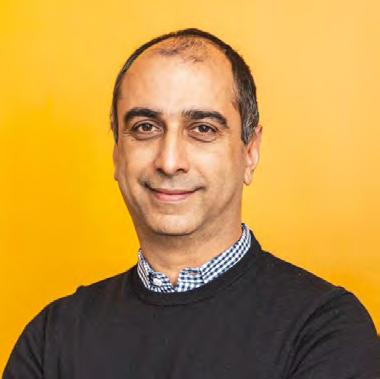
Nikhil Anand
CASI Associate Faculty Director, Daniel Braun Silvers and Robert Pater Silvers Family Presidential Professor of Anthropology; Director, EnviroLab
I have just completed my second year as Associate Faculty Director, and have been so pleased and energized to be part of CASI’s relentless focus on world-shaping research, on the ways it builds communities of scholarly exchange between India and the United States, and how it demonstrates the power of free thinking, fellowship and collaboration across the world’s two largest democracies. When viewed with the uncertainties that structured the pandemic, and the challenging political environment that Ivy League institutions like Penn currently face, CASI’s achievements these past five years have been all the more remarkable. We at CASI owe a tremendous debt to the leadership of our outgoing Director, Tariq Thachil, who has just completed a phenomenally successful five-year term. During this time, Tariq expanded CASI’s mission through careful and generous outreach and collaboration. He has supported, institutionalized and formalized various aspects of CASI’s mission—both on campus and off campus—that makes the Center stronger and more established going forward.
On campus, CASI has broadened its intellectual agenda— beyond its focus on political economy—towards the fields of anthropology, economics, environment, health, history and sociology. In so doing CASI has consolidated an enviable community of research scholars working on and in contemporary India at the University of Pennsylvania. As a result, CASI’s weekly academic year seminars are phenomenally well attended. With several visiting speakers drawing larger numbers, CASI’s staff regularly need to mobilize extra chairs to seat our growing community!
Expanding CASI’s ambit to diverse scholars studying India has also allowed CASI to build and broaden intellectual interest and support for the research it is doing at Penn. One area in which the benefits of its expansion is visible is with its postdoctoral fellows program. This past year, close to a hundred junior scholars from leading Ph.D. granting institutions applied for three positions. The work of our current postdoctoral fellows on campus—centered on themes of political representation, medicine and the environment—has been very well received and has served to substantively increase both their research profiles as well as CASI’s at the University and beyond. You will find more details about their terrific work in the pages of this report.
CASI’s success as a leading center for the study of India in the United States is built on a strong and rigorous tradition of intellectual exchange between Indian educational institutions, NGOs and policy centers. While the internship program has long given Penn’s undergraduate students an opportunity for hands on learning via summer internships in India,I am especially pleased with the substantive expansion of CASI’s Visiting Scholar/Fellows program that has taken place over the last few years with more in-residence including the Saluja Global Fellows and nonresident affiliates.
Scholars and professionals based in India focusing on Indian politics, economics and the environment have of course done significant, deep and engaged work for a long time. In bringing them and their expertise to Penn through short-term visiting fellowships, CASI doesn’t just bring the most cutting-edge work on India to benefit the University community. It also gives scholars and fellows some time and space away from their commitments in India so that they can both complete long-standing projects, and begin new ones, in collaboration with scholars and students in the Penn community.
These are just a few examples that detail the ways in which CASI is deepening and strengthening relationships between Indian and U.S.-based institutions, and particularly at the University of Pennsylvania, these past years. Of course, none of this work would be possible without the ethos of professionalism, care and support nurtured by its staff. Undergraduate and graduate students, faculty at Penn and invited speakers, visiting scholars and visiting fellows, all share their experiences of hospitality, collegiality and care with staff at the Center with an enthusiasm that is infectious. The experiences of CASI that they take with them into our communities at Penn and in India, detail the generativity of working with a spirit of camaraderie, collaboration and support in these most challenging of times.
With Tariq stepping down at the conclusion of his term, I am pleased to serve as CASI’s Interim Director for 2025–26. Having experienced the CASI ethos myself these past years, I do confess that the Center also inspires and powers me forward, giving me joy and hope for the days ahead. I look forward to welcoming you to the Center this Fall.
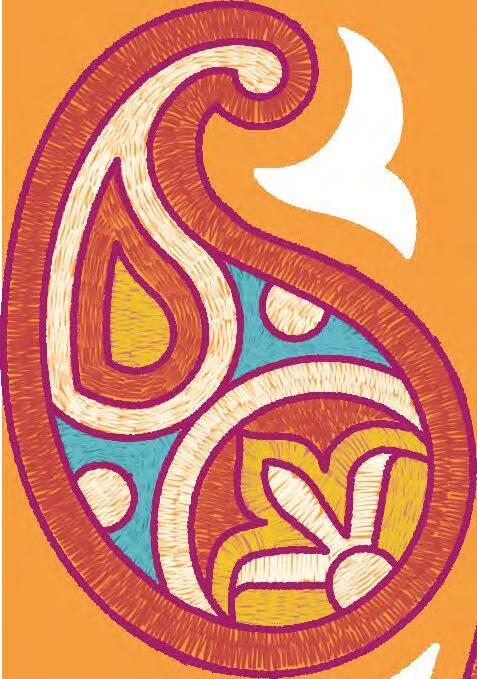
CASI generates high-quality empirical research and analyses, builds rigorous and innovative data sets, and creates long-term collaborations with academics, policymakers, and practitioners working in India and the U.S. Our research focuses on critical and understudied areas of India’s economy, politics, and society.
Major themes include: Migration
Environment
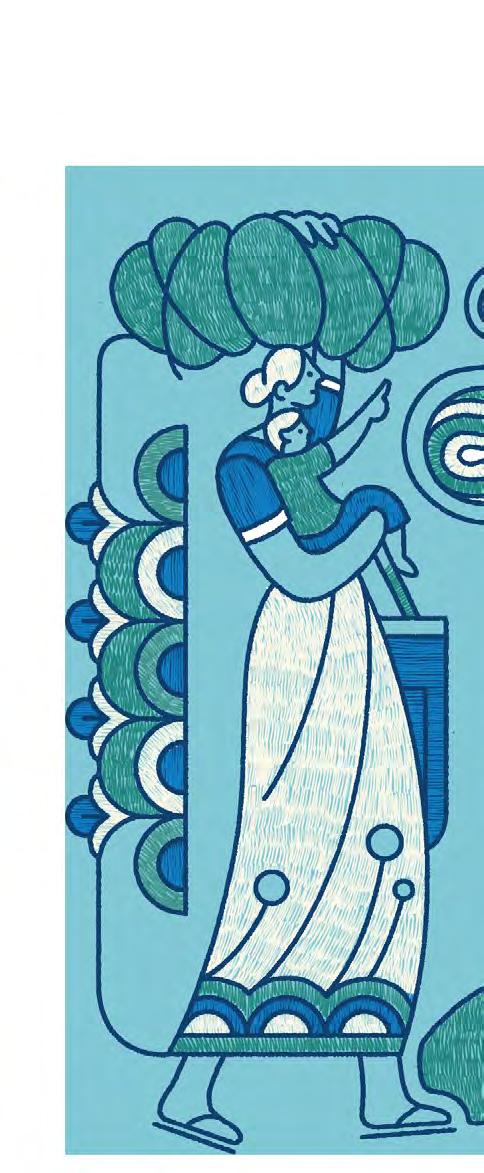
3
NEW RESEARCH GRANTS
4
ARTICLES PUBLISHED BY CASI POSTDOCS, 3 SUBMITTED FOR PEER REVIEW
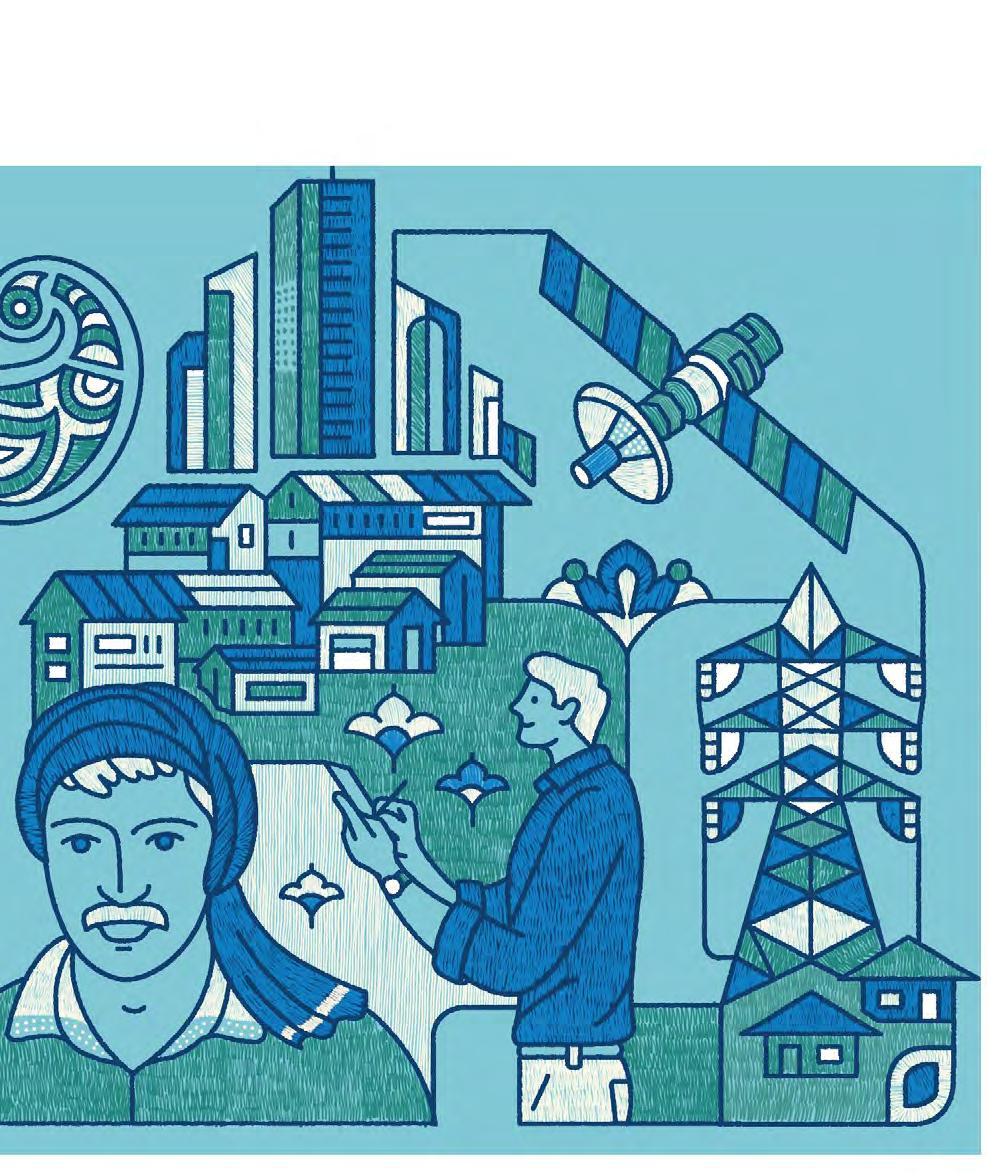
1
NEW RESEARCH AGENDA ON CLIMATE CHANGE HEADED BY ASSOCIATE FACULTY DIRECTOR NIKHIL ANAND
Across India, air pollution offers a stark example of environmental degradation. Large portions of the country, including many major cities, are consistently ranked as having the most polluted air in the world. Yet despite its adverse consequences for public health, opinion surveys suggest air pollution is not prioritized as an important election issue by Indian citizens, even within highly impacted areas like the national capital of Delhi. Why? We test several potential explanations through a major household survey of over 3,000 residents across Delhi-NCR. In doing so, we provide some of the first rigorous data on how residents of Delhi view the problem of air pollution and how they evaluate potential policy solutions. An initial working paper from this project is available here .
In a related research study, we examine how India’s policymakers view the issue of air pollution. Specifically, we examine why elected officials take low or ineffective policy actions to reduce air pollution. This research will draw on the findings of a unique in-person survey of state-level representatives across north India, the first such survey of elite politicians in India. Our findings hope to shed light on how India’s politicians strategically view environmental policymaking.
This project was recently awarded two grants: from Penn’s Office of the Vice Provost for Research’s (OVPR) University Research Grant and Penn Global’s India Research and Engagement Fund Grant.
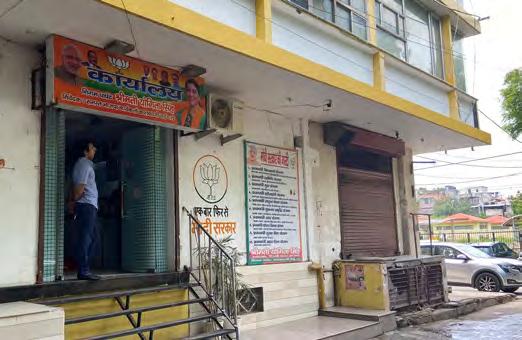

RESEARCH AFFILIATES



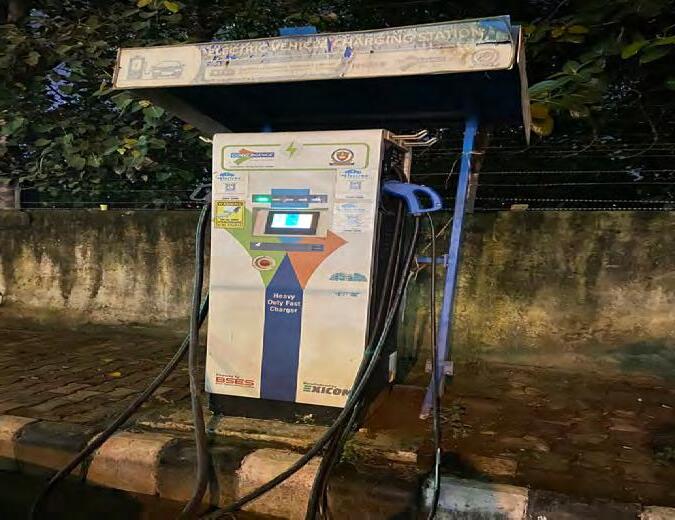
Amidst calls for urgent climate adaptation, this project dwells in the everyday stories of development, infrastructure and dwelling of marginalized urban residents in Mumbai that are often drowned out by the formalized procedures of expert knowledges of climate change action.
The stories gathered in this project will describe subordinated modalities of praxis; of how urban residents understand climate change and act amidst climate and ecological uncertainty. The PIs propose to put these stories in conversation with ongoing official climate planning processes underway in India and diversely situated publics through several community engagement workshops, an online multimedia exhibition, op-eds and a policy brief, taught course, peer-reviewed articles, conference, and book publication. Together with official, more formalized initiatives, “Stories of Climate Action” promises to produce new paradigms of how the most catastrophic effects of climate change might be mitigated and adapted to in Indian cities in the near future.
In 2022 the project received major funding from Penn Global. The grant supports 3 co-PIs and 8 fellows conducting research in Mumbai, documenting the nuanced ways in which marginalized populations in Mumbai live in climate-changed environments.
In Spring 2024, CASI and EnviroLab hosted a 2-day conference at the University of Pennsylvania. Titled “Stories of Climate Action,” the first day of the event was held at the Kleinman Center for Energy Policy and featured research presentations and a discussion of the Mumbai-based research, and drew approximately 80 participants from the University and beyond. The second day featured a workshop, where researchers from ten universities across four continents shared their work on the topic. Papers presented at this conference will be key to the production of an edited volume, as well as a special issue submission in FY25.



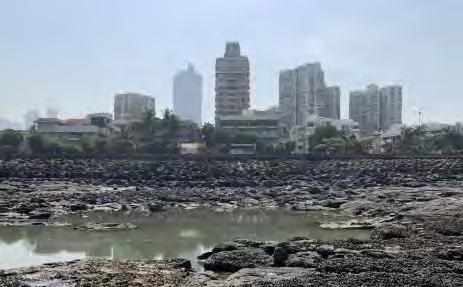
CASI has launched the first systematic set of studies on the political economy of “small-scale urbanization” in India. A significant percentage of urban residents across the Global South live in small towns. In India, the percentage of citizens living in cities with populations less than 100,000 residents equals those living in million-plus cities. Indeed, 85% of India’s towns have less than 100,000 people. Yet little is known about the political economy of these urban local bodies. What governance challenges do small towns face? Why are small towns so unsuccessful in raising tax revenues? Why do they often fail to spend the funds provided to them by central and state governments?
This project has yielded numerous outcomes. The first paper from this project was published in the American Political Science Review. Two other working papers are being prepared for submission, both of which have been presented at various academic conferences and workshops. Finally, CASI organized a policy workshop in New Delhi to disseminate findings from this research to a group of scholars and policymakers. This workshop was held in March 2025, in collaboration with UPIASI, and the Directorate of Local Bodies in the Indian state of Rajasthan.
RESEARCH AFFILIATES


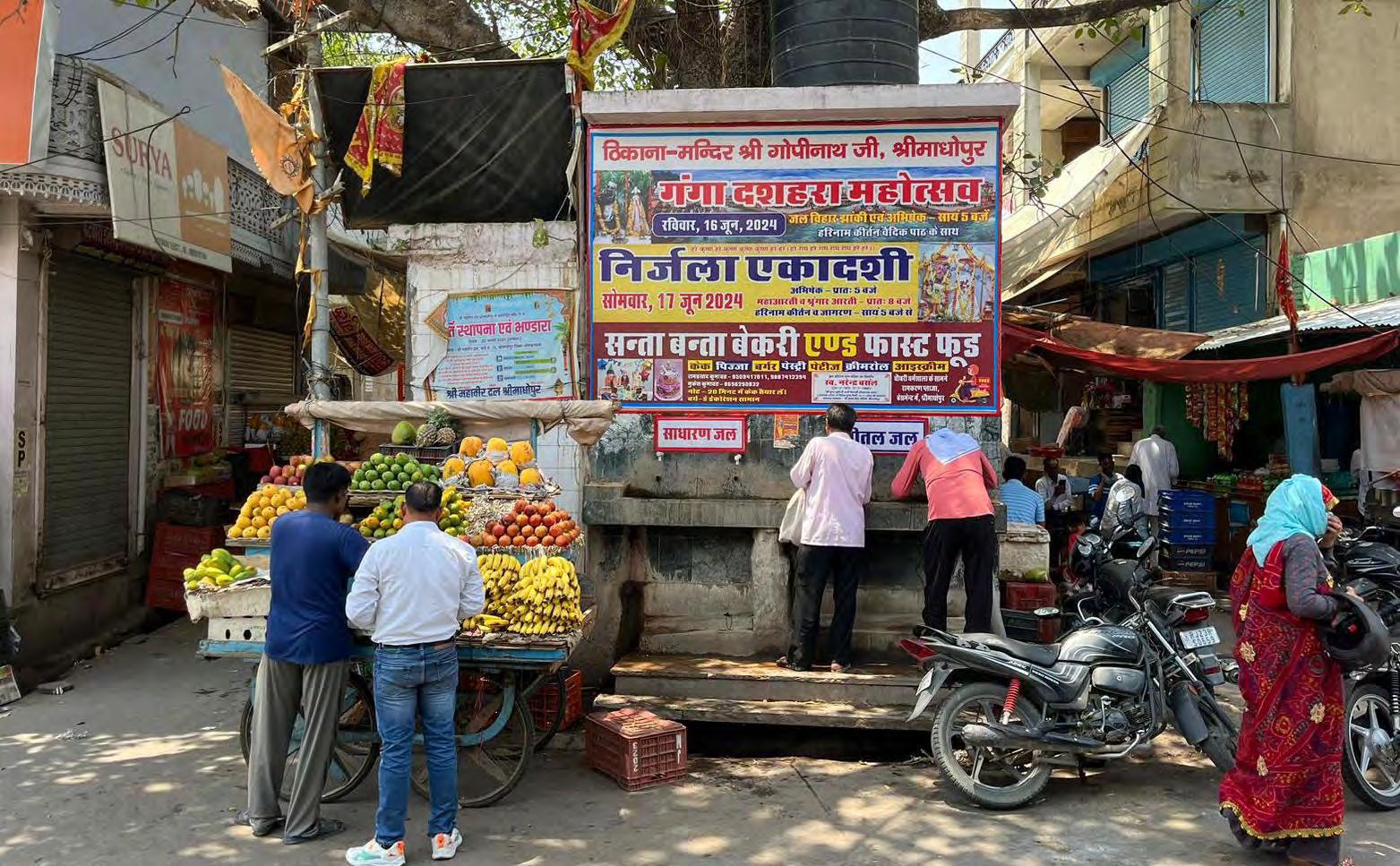
What are urban seas made of? And how might those working in urban seas provide new modes and idioms for living in cities with sea level rise? This project provincializes the grounds of urban planning and urban theory by attending to the ways in which fishers living in the city in the sea are already organizing their livelihoods and social worlds with anthropogenic climate change and coastal pollution. Their changing practices may reveal new ways to live in cities in the sea in the future.
This recently completed book manuscript by Nikhil Anand, focuses on the work of fishers, scientists and city planners as they work to understand, inhabit and settle the turbid relationships of the city in the sea. Most of the ethnographic research of Urban Sea was gathered between June 2018 and August 2019. Owing to a series of transportation infrastructure projects being staged in the sea during this time, the relationships between urban government, citizen scientists, fishers, environmental activists, and concerned citizens were (and continue to be) especially fraught.
In the book, Anand shows how the urban sea is a deeply contested, amphibious space. First, the municipal government continues to colonize the edges of the terrestrial city, filling these regions with the profits and prerogatives of real estate. Next, fishers negotiate the dynamic qualities of the sea even as it is increasingly made of warmer waters, concrete, sewage and more unpredictable ecologies. Finally, amidst the restive monsoons and seas of climate change, storm water engineers are increasingly concerned that their massive infrastructures, can only be as tenuous and impermanent as the urban sea in which they are staged. Urban Seas explores the possibilities and meanings with which social, technical and environmental futures are being made in the coastal city after the infrastructures that separate land and water collapse with climate change.
https://www.inhabitedsea.org/urban-sea
RESEARCH AFFILIATE

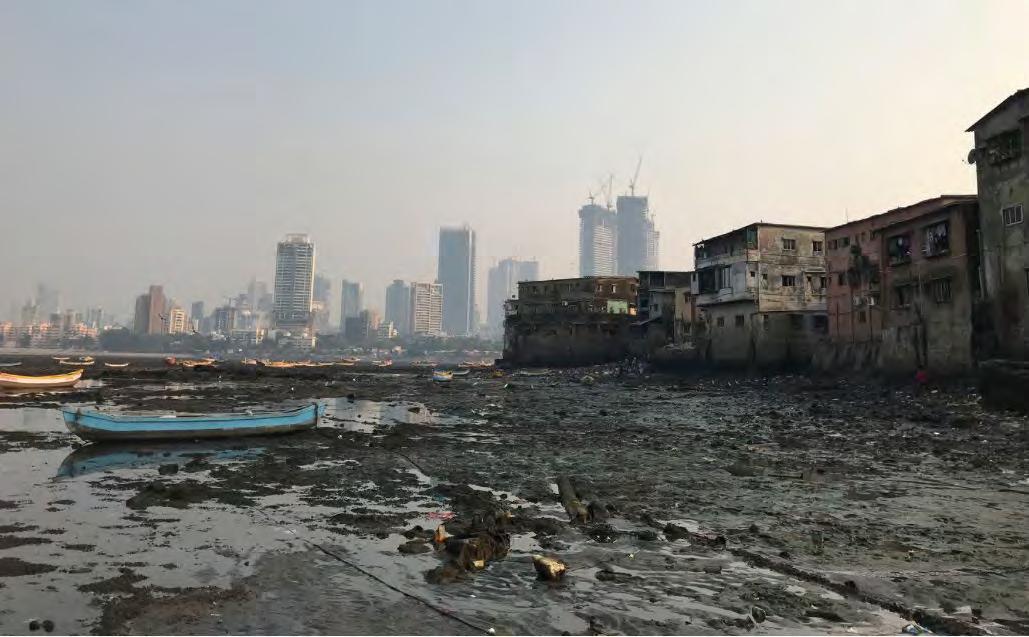
This research agenda is led by 2024–25 Climate Postdoctoral Research Fellow Matt Barlow (Ph.D. in Anthropology, 2023, University of Adelaide). Matt works on questions related to environment, infrastructure, and waste in urban South India. Through this project, he analyzes efforts to address a waste crisis in Kochi, Kerala, by arguing that understandings of what waste is, and how infrastructures should be designed to manage it, are heavily influenced by environmental imaginaries. Across much of India, both waste and weather are categorized into two qualities: wet and dry. Matt takes these shared qualities as a starting point to investigate the relationship between monsoonal weather and the management of waste in Kochi.
By placing Kochi’s wet, monsoonal, and coastal ecology at the heart of questions about urban infrastructures in this historic and dynamic city, Matt critiques urban development projects that rely on the production and maintenance of solid ground in an inherently wet environment. If, as one government official recalled, “Kochi is a big house without a toilet,” how does a perceived lack of land and an abundance of water impact not only what can be done about waste, but foundational ideas about what kind of problem waste is to begin with? In asking these questions, Matt also highlights that the infrastructures responsible for filling the ocean and other watery places with the excesses of late liberal consumption, are also the infrastructures largely responsible for anthropogenic climate change.
This research will culminate in Matt’s first book, Weathering Waste, to be published with an academic press. In May 2025 he hosted a manuscript workshop for the book at CASI with anthropologists Radhika Govindrajan (University of Washington), Amy Zhang (NYU), and Nikhil Anand. This workshop was jointly supported by both CASI and the Penn’s Wolf Humanities Center.
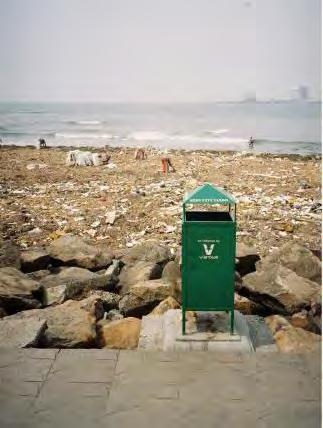
RESEARCH AFFILIATE

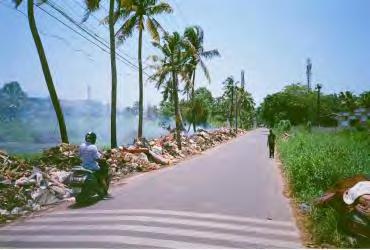
This research agenda is led by CASI Postdoctoral Research Fellow Kiran Kumbhar (Ph.D. in History of Science, 2022, Harvard University). One part of this agenda relates to Kiran’s new project tentatively titled “India After Bhore—Health Policy and Healthcare Reform in Post-independence India.” The recommendations of the Bhore Committee Report of 1946, including that of making medical and public health services accessible to everyone “irrespective of their ability to pay,” were regularly cited by early post-independence political leaders as legitimate state objectives (“healthcare for the public”). However, despite the egalitarian ambitions of the Committee and India’s early leaders, the overarching theme in Indian health policy after independence has been that of persistent and often deepening disparities. Kiran will examine how the social and cultural backgrounds of politicians, bureaucrats, administrators, and public health experts influenced which concepts and claims prevailed, and which were ignored, in the health policies they drafted and the infrastructure they established. As many scholars and activists have shown, most of India’s healthcare policies and infrastructure have hierarchies and inequalities already baked into them. While commonly the gaze in health disparities research focuses on the underprivileged and their struggles, in his research Kiran will turn the gaze onto the elites, and their actions and inactions which give rise to the struggles of the underprivileged in the first place. In February 2025 Kiran gave a talk at the University of British Columbia in Vancouver based on some of this research.
Kiran also works to bring scholarly historical research into the wider Indian public discourse, and to raise public awareness regarding academic methodologies and historical thinking skills (“history for the public”). His critical review of the popular history book The Golden Road: How Ancient India Transformed the World, published in November 2024, received acclaim from scholars and readers alike. Since December 2024 he has been maintaining a website—“University of History” —dedicated to introducing readers to academic historians and their articles, books, and research methods.
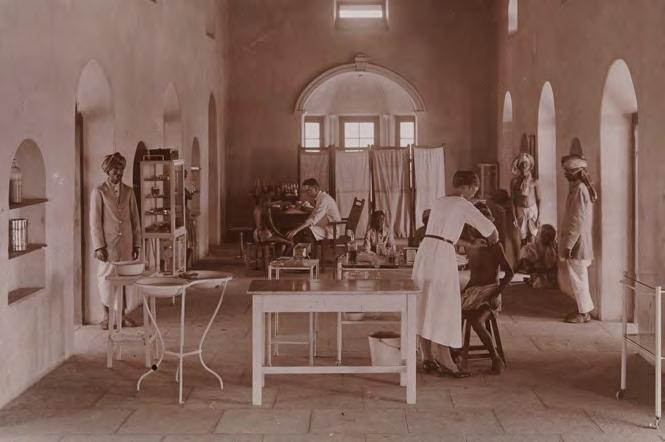
RESEARCH AFFILIATE


This research agenda is led by CASI Postdoctoral Research Fellow Shahana Sheikh (Ph.D. in Political Science, 2024, Yale University). The research question that motivates this agenda is: how do large-scale development-related transformations affect Indian democracy? The focus is on three development-related transformations that are underway in India: shifts in media and communication technology, urbanization, and environmental degradation. The work is centered on three themes of democracy in India: political parties, political behavior, and partyvoter linkages, with particular attention to party strategy, campaigns, and political participation. Shahana uses a variety of research methods, including in-depth, semi-structured interviews, participant observation, grounded theory, content analysis, surveys, and survey experiments.
Shahana’s book project, based on her doctoral dissertation, investigates how Internet-based communication technologies—including social media—affect the behavior of political parties and voters in India. She develops a theory to understand the ways in which these technologies shape party campaigns, party organization, and patterns of political participation. To evaluate the theory’s predictions, Shahana employs a multi-method research design that brings together evidence from several months of qualitative fieldwork conducted during multiple election campaigns and at party offices in North India, three original face-to-face quantitative surveys, and a systematic analysis of political parties’ social media content. The book will advance our understanding of how digital technologies are reconfiguring democratic practices in India.

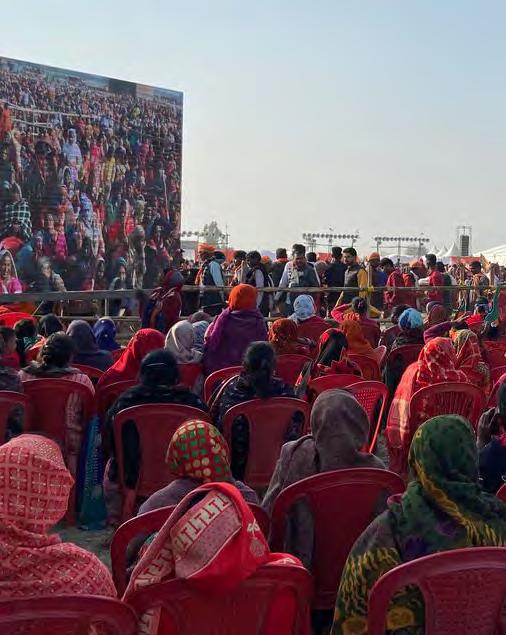
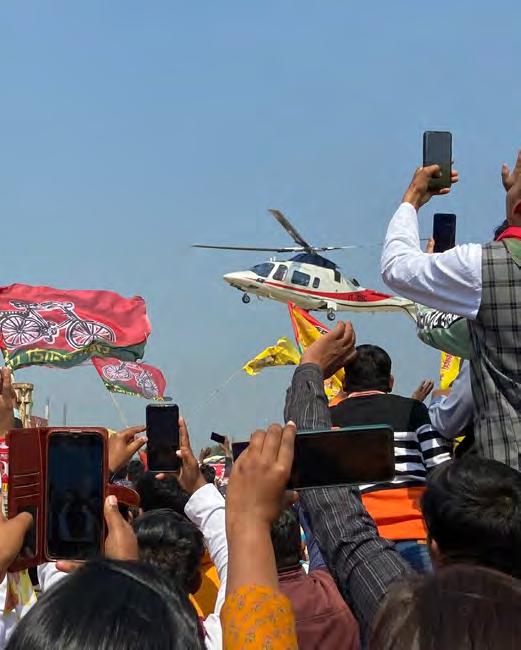
Adwaita Banerjee (Doctoral Candidate in Anthropology, 2022 Summer Research Grants recipient , and 2024 Dean’s Scholar)— and advisee to CASI Associate Faculty Director Nikhil Anand: featured in ” Inside the Dumping Grounds of Mumbai ,” by Marilyn Perkins, Omnia , July 8, 2024 and “ The Anthropology of Plastics in India ” by Kristina García, Penn Today, July 9, 2024.
CASI Director Tariq Thachil and CASI Non-Resident Scholars Adam Auerbach (Johns Hopkins School of Advanced International Studies) and Shikhar Singh (Duke University; CASI Postdoctoral Research Fellow 2022–24): “ Who Knows How to Govern? Procedural Knowledge in India’s Small-Town Councils ,” American Political Science Review, July 31, 2024.
CASI Director Tariq Thachil and CASI Non-Resident Scholar Milan Vaishnav (CEIP) were selected as India’s political thought leaders of the next decade by ThePrint, December 7, 2024.
CASI Director Tariq Thachil and CASI Non-Resident Scholar Adam Auerbach (SAIS, JHU) were the winners of the 2025 Association for Asian Studies’ Ananda Kentish Coomaraswamy Prize and the 2025 Francine Frankel Prize for Best Book for their book Migrants and Machine Politics: How India’s Urban Poor Seek Representation and Responsiveness (Princeton University Press, 2023).
CASI Non-Resident Scholar and 2022-24 Postdoctoral Research Fellow Amrita A. Kurian : “ Flowers of Deception: The Expert’s Nostalgia for a Future’s Past and its Occlusion of Agrarian Labor,” Cultural Anthropology, Summer 2024.
CASI Non-Resident Fellow and 2022-24 Postdoctoral Research Fellow Amrita A. Kurian (Ashoka University): “ ’Progressive Farmers’ and the Moral Economy of Standardization in Indian Agri-commodity Markets ,” Geoforum, May 2025.
CASI Postdoctoral Research Fellow Kiran Kumbhar : “ What the Doctors’ Protests in India are Missing ,” STATNews , September 16, 2024.
Eswaran Sridharan (Director & Chief Executive Officer, University of Pennsylvania Institute for the Advanced Study of India) co-edited with Sumit Ganguly (Hoover Institution): The Oxford Handbook on Indian Politics (Oxford University Press, 2024).
CASI Non-Resident Scholar and 2022–2024 Postdoctoral Research Fellow Sarath Pillai (Southern Methodist University): “A Personal Archive of the AIDS Pandemic ,” History Workshop, September 24, 2024.
CASI Non-Resident Scholar and 2022–24 CASI Postdoctoral Research Fellow Sarath Pillai (Southern Methodist University): “ From International to Imperial: The Indian Princely States, International Law, and the Ends of Empire in South Asia ,” Leiden Journal of International Law, May 23, 2025.
CASI Fall 2024 Visiting Scholar Hilal Ahmed (Associate Professor, Centre for the Study of Developing Societies) was interviewed by NDTV about his book, A Brief History of the Present: Muslims in New India (Penguin-Random House, 2024). He also received the annual Ramchandra Khan Social Science Award (presented by the Patna-based Lok Darshan Nyas) for his book Allah Naam ki Siyasat (Hindi, Setu Prakashan, 2023).
Sudev Sheth (Senior Lecturer, History, The Lauder Institute; CASI 2014 Summer Research Funds Recipient) presented his new book, Bankrolling Empire: Family Fortunes and Political Transformation in Mughal India (Cambridge University Press, 2024) at an October 24, 2024 Penn symposium [ Video]
Devesh Kapur (Starr Foundation Professor of South Asian Studies, Johns Hopkins School of Advanced International Studies; CASI Director, 2006–18, Senior Fellow, 2018–23), Milan Vaishnav (Carnegie Endowment for International Peace; CASI NonResident Fellow), and Sumitra Badrinathan (American University; CASI Sobti Family Doctoral Fellow, 2020–21): “ Indian Americans at the Ballot Box: Results From the 2024 Indian American Attitudes Survey,” CEIP Report, October 28, 2024. The report was the subject of “ Deciphering the Indian American Vote ,” CEIP webinar, October 31, 2024 and was followed up by March 2025 CEIP Report “ Foreign Policy Attitudes of Indian Americans: 2024 Survey Results ,” co-authored with Annabel Richter (CEIP).
Summer 2024 Aravind Eye Care System Alum Amanda Kossoff (Vagelos Life Sciences & Management Dual-Degree Program’27) and her team, Stentix, won the 2025 Penn Y-Prize
In keeping with CASI’s commitment to supporting research on contemporary India across the social sciences, these scholars hail from a variety of disciplines, including anthropology, economics, history, and political science. Their work showcases research excellence across a wide range of methodological orientations and subject areas. From the workings of agricultural markets and supply chains to the impact of female labor force participation, from the impact of air pollution and coastal flooding to pre-independence debates on federalism, these innovative scholars will continue to shape our understanding of many of India’s most pressing concerns. We are delighted to have them enrich our Center.
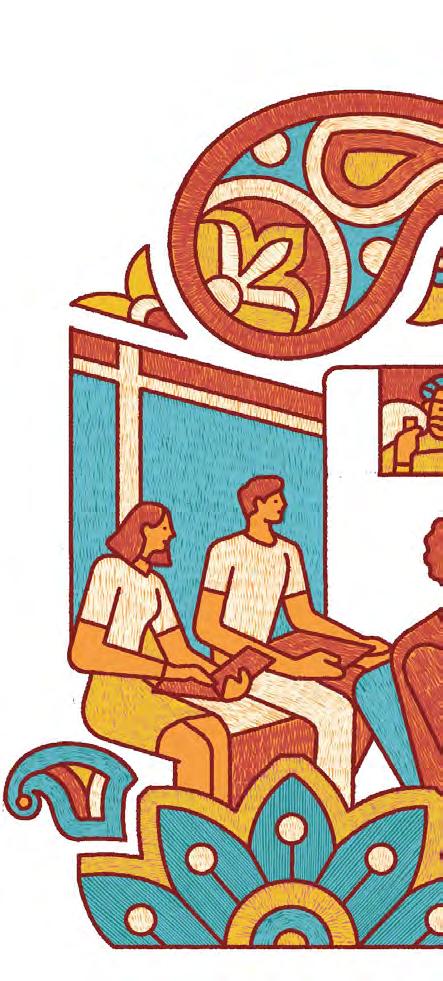
111
TOTAL SCHOLARS/ FELLOWS SINCE THE PROGRAM BEGAN
THIS YEAR, NON-RESIDENT SCHOLARS AND FELLOWS REPRESENT: 17
INSTITUTIONS IN 6 COUNTRIES
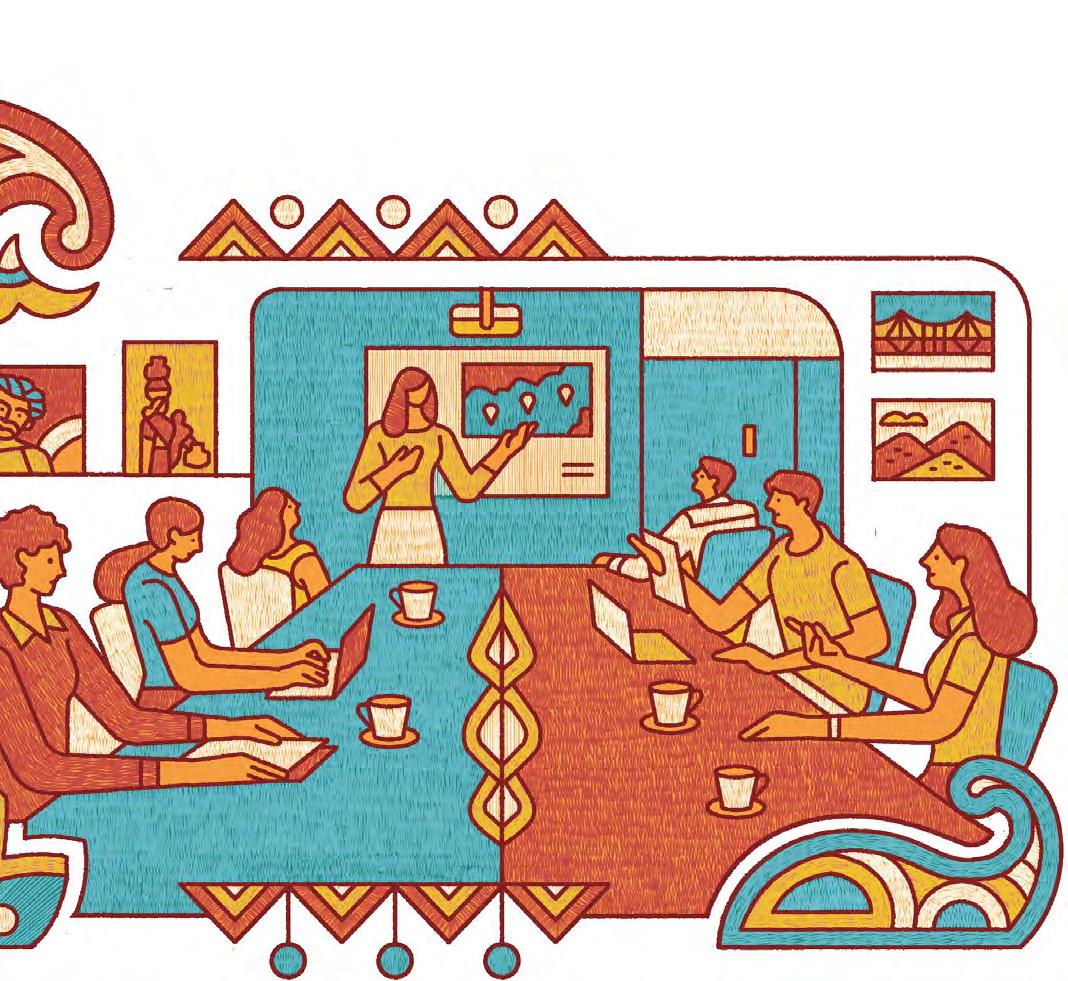
9 ARE CO-PIs ON CASI MAJOR RESEARCH GRANTS AND OTHER SPONSORED FUNDING
CASI’s Visiting Scholars/Fellows Program is designed to bring individuals to the University of Pennsylvania with different areas of expertise from academia, the bureaucracy and civil services, NGOs, and civil society (such as media). Scholars and fellows participate in CASI events; engage in scholarly research projects; present their research as a part of the CASI seminar series; and interact with students, Penn faculty, and researchers.
The program aligns with CASI’s goals of nurturing a new generation of intellectual leadership on contemporary India. CASI also collaborates with departments and schools across Penn to co-sponsor visiting scholars and fellows. Outside Penn, CASI has partnered with the New India Foundation in bringing past New India Foundation Fellows to the Center.
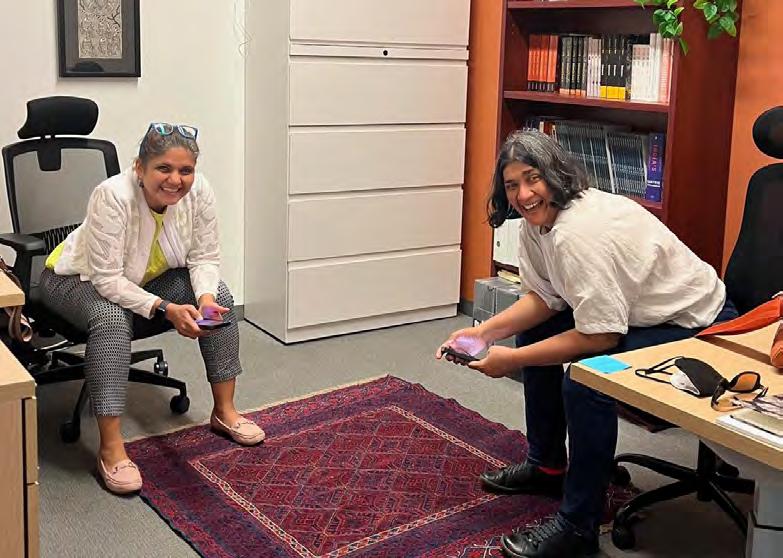
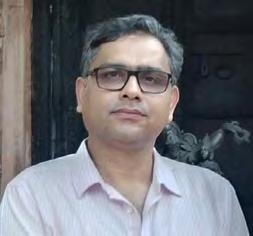

Hilal Ahmed
Associate Professor, CSDS, New Delhi, Fall 2024
Hilal Ahmed is an Associate Professor at the Centre for the Study of Developing Societies (CSDS), New Delhi and was a CASI Fall 2024 Visiting Scholar. He works on political Islam, Indian democracy, and politics of symbols in South Asia. He is also a faculty member of the Lokniti program at CSDS. His first book, Muslim Political Discourse in Postcolonial India: Monuments, Memory, Contestation (Routledge 2014), explores these thematic concerns to evolve an interdisciplinary approach to study Muslim politics. His recent books, A Brief History of the Present: Muslims in New India (Penguin-Random House 2024), Allah Naam ki Siyasat (Hindi, Setu Prakashan, 2023), Siyasi Muslims: A Story of Political Islam in India (Penguin-Random House, New Delhi, 2019), and Democratic Accommodations: Minorities in Contemporary India (with Peter R. deSouza and Sanjeer Alam, Bloomsbury, 2019) further elaborate these themes and make a modest attempt to explain the discursively constituted nature of contemporary Muslim political discourse in India. Ahmed is the Associate Editor of South Asian Studies, the journal of the British Association of South Asian Studies. He is also part of the editorial team of CSDS’s Hindi journal Pratiman. He has produced two documentaries, Encountering the Political Jama Masjid (English, 2006) and Qutub: Ek Adhura Afsana (Qutub: An Unfinished Story, Hindi with English subtitles, 2016). The film Beacons of Hope (English, 2008) documents Ahmed’s life story.


Lubaina Rangwala
Program Head, Urban Development & Resilience
World Resources Institute India, Spring 2025
Lubaina Rangwala is Program Head, Urban Development & Resilience with the Sustainable Cities and Transport team at World Resources Institute (WRI), India. She is an Urban Planner and Architect from Mumbai, with over 18 years of work experience in India and the U.S. Her current work involves operationalizing sub-national climate action plans and heat and flood resilience measures in Indian cities. Lubaina has led key publications at WRI, including the Climate Hazards and Vulnerability Assessment framework for Indian cities and established the global tool, the Urban Community Resilience Assessment. She earned her undergraduate degree in architecture from the Kamla Raheja Vidyanidhi Institute for Architecture (KRVIA), Mumbai University, and a dual Master’s in Architecture and City and Regional Planning from the University of California, Berkeley, with a focus on housing, community, and economic development. Lubaina was a Spring 2025 CASI Visiting Scholar.
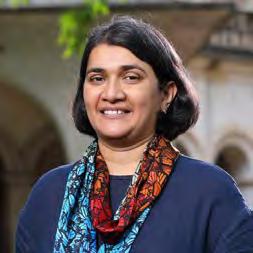

Jahnavi Phalkey
Founding Director, Science Gallery Bengaluru, Spring 2025
Jahnavi Phalkey is the Founding Director of Science Gallery Bengaluru, a public space for research-based engagement across the human, social, and natural sciences. She is the author of Atomic State: Big Science in Twentieth Century India (Permanent Black, 2013) and has co-edited Science of Giants: China and India in the Twentieth Century (Cambridge University Press, 2016). She is the producer-director of the 2020 documentary Cyclotron and was awarded the 2023 Infosys Prize in Humanities. She was a CASI Spring 2025 Visiting Scholar.

Adam Auerbach Associate Professor, School of Advanced International Studies, Johns Hopkins University
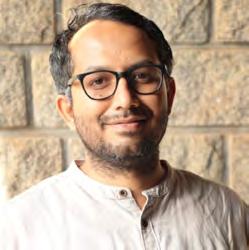
Naveen Bharathi Assistant Professor of Public Policy, Indian Institute of Technology Bombay
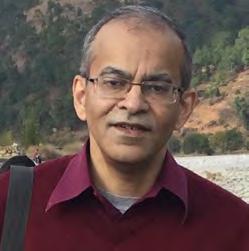
Swagato Ganguly Senior Fellow, The Convergence Foundation
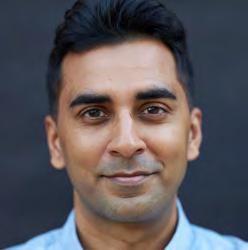
Bilal Baloch Partner, Shorooq Partners Co-Founder and Board Member, Enquire AI
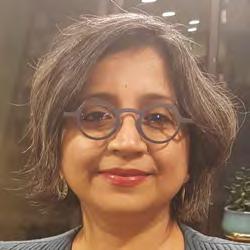
Debjani Bhattacharyya Chair, History of the Anthropocene, University of Zürich
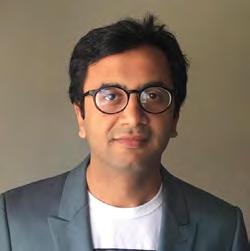
Nafis Aziz Hasan Assistant Professor of Anthropology, University of Amsterdam
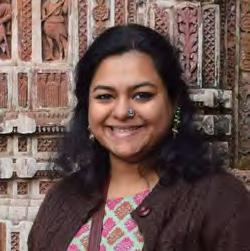
Ranjini Basu Garware Post-Doctoral Fellow, UPIASI

Sanjoy Chakravorty Professor of Geography and Urban Studies and Director of Global Studies, Temple University
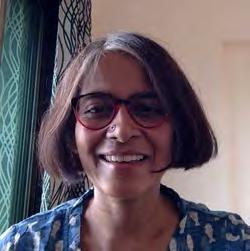
Lalitha Kamath Fulbright Visiting Scholar, Penn Department of Anthropology Urbanist & Planner
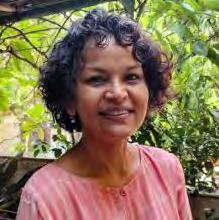
Amita Baviskar Professor of Environmental Studies and Sociology & Anthropology, Ashoka University
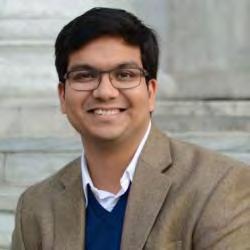
Shoumitro Chatterjee Assistant Professor of International Economics, School of Advanced International Studies, Johns Hopkins University

Radhika Khosla Research Director, Oxford India Centre for Sustainable Development, Somerville College Associate Professor, Smith School of Enterprise and Environment, School of Geography and the Environment, University of Oxford
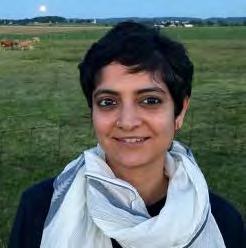
Mekhala Krishnamurthy
Associate Professor of Sociology and Anthropology, Ashoka University
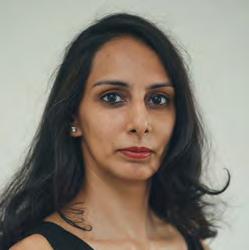
Rukmini S. Founder & Director Data For India

Milan Vaishnav
Senior Fellow & Director, South Asia Program, Carnegie Endowment for International Peace
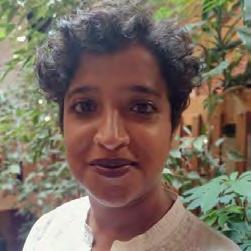
Amrita A. Kurian
Visiting Faculty, Department of Sociology and Anthropology, Ashoka University

Mark Schneider Political Scientist and Researcher Adviser, Community Change
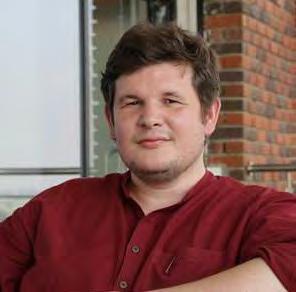
Gilles Verniers
Senior Fellow, Centre for Policy Research, New Delhi
Karl Loewenstein Fellow & Visiting Assistant Professor in Political Science, Amherst College
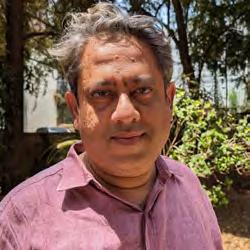
Rohit Mujumdar
Assistant Professor, School of Environment and Architecture, Mumbai

Neelanjan Sircar Associate Professor School of Arts and Sciences, Ahmedabad University

Adam Ziegfeld
Associate Professor, Department of Political Science, Temple University
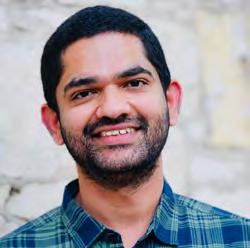
Sarath Pillai
Kenneth Pye Visiting Assistant Professor in South Asian History, Southern Methodist University
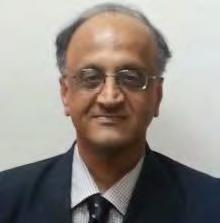
Eswaran Sridharan Director & Chief Executive Officer, UPIASI
The CASI Postdoctoral Research Fellowship Program provides dynamic early career researchers with a one- to two-year opportunity to establish their profile as scholars of contemporary India. The fellowship has no teaching obligation, providing young scholars with valuable time to advance their own research agenda. The Center also provides support in connecting Fellows to its considerable networks among scholars and policymakers both in the U.S. and in India.

Matt Barlow
CASI Climate Postdoctoral Research Fellow 2024-25
Matt Barlow is a cultural anthropologist interested in how situated socio-ecological imaginaries influence responses to planetary crises. His doctoral research project demonstrated how different understandings of monsoonal wetness influenced approaches to waste infrastructure in Kochi, India. This research contributes to several debates within cultural anthropology, critical geography, postcolonial studies, and the environmental humanities. As Climate Postdoctoral Research Fellow at CASI, Matt is working on his first book titled Weathering Waste, while also contributing to Nikhil Anand’s project “Stories of Climate Action: Negotiating Planning in Mumbai’s Wetscapes.”
Matt completed his Ph.D. in Anthropology with Dean’s Commendation from The University of Adelaide in 2023, the same year he completed a 9-month Postdoctoral Research Fellowship at the University of St. Andrews on the project “Toward a Political Ecology of Volume.” Between 2019 and 2022, Matt was a contributing producer for the Conversations in Anthropology podcast, as well as an active member of the TopEndSTS research collective based in Darwin, Australia. You can learn more about Matt’s academic and creative work at his website and find him on social media with the handle @materialbarlow.

Kiran Kumbhar
CASI Postdoctoral Research Fellow, 2024-25
Kiran Kumbhar is a historian, writer, and public health expert, working primarily on the history of medicine and public health in modern India, and on the history of global public health. His Ph.D. dissertation explored the problem of “declining” trust in biomedical doctors and highlighted the major role that caste-based privilege has played in the history of the Indian medical profession. He is currently working on research projects that look at the history of healthcare policy in India, the role of caste in colonial and postindependence healthcare, and the discourse and debates on traditional medicine. He has taught courses at Harvard, Yale, and Johns Hopkins in the history of science and the history of medicine and public health across multiple geographies, and in South Asian history. Kiran also works to bring academic scholarship into the larger public discourse through writing and podcasting. In 2022-23 he worked with the Suno India platform on a podcast series: “Becoming Modern: Healthcare and History in India.” His writings have been published in The India Forum, The Wire, Scroll, The Hindu, The Times of India, fiftytwo, The Swaddle, and Quartz

Shahana Sheikh CASI Postdoctoral Research Fellow, 2024-25
Shahana Sheikh studies political parties, political behavior, and party-voter linkages, with a regional focus on South Asia. Her research agenda is centered on how party strategy, campaigns, and political participation in developing democracies are shaped by significant transformations associated with development—especially, shifts in media and communication technology, urbanization, and environmental degradation. Shahana completed her Ph.D. in Political Science from Yale University. Her dissertation examined how Internet-based communication technologies— including social media—affect the behavior of political parties and voters in India. She uses a variety of research methods, including indepth, semi-structured interviews, participant observation, grounded theory, content analysis, surveys, and survey experiments. Prior to her Ph.D., Shahana was a policy researcher in the areas of urban governance and public finance in India. You can read more about her research at shahanasheikh.com.
Fellows are also expected to play a key role in the Center’s thriving intellectual community by organizing the academic year seminar series and planning workshops. They also serve as mentors to the incoming CASI-affiliated graduate students and on selection committees for CASI Student Programs’ annual competitions .
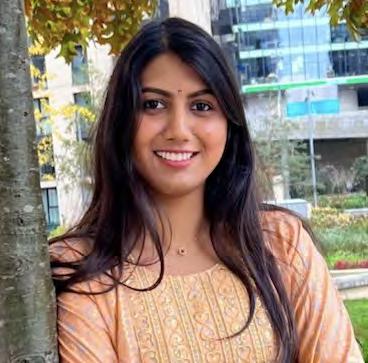
Aparna Pasumarthy
UPIASI Garware Postdoctoral Research Fellow 2024-25
Aparna Pasumarthy is the Garware Postdoctoral Research Fellow at the University of Pennsylvania Institute for Advanced Study of India (UPIASI) and a CASI Non-Resident Scholar. Her research interests include gender, careers, organizational behavior, and leadership. Aparna’s postdoctoral research project focuses on the (un)sustainable careers of professional men and women in India. The study examines the personal and professional aspirations of individuals in contemporary India considering their contexts (societal, organizational, individual) and delineates how professionals navigate their careers and life.
Aparna is an interdisciplinary qualitative researcher. She earned a Ph.D. (Business and Management) from Queen Mary, University of London in 2024. Her doctoral thesis examined Indian professional women’s definitions of success, their defining career experiences, and career advancement strategies. Aparna has presented her research at several international conferences and intends to publish her work in leading academic journals. Prior to her Ph.D., Aparna completed her M.Sc. (International Management) at the University of Bath and her Bachelors (Commerce) from Osmania University.
Apart from research, Aparna enjoys making complex management theory accessible to students. She taught postgraduate and undergraduate students for three years at the School of Business and Management, QMUL. Among other professional affiliations, Aparna is an Associate Fellow of the Higher Education Academy.
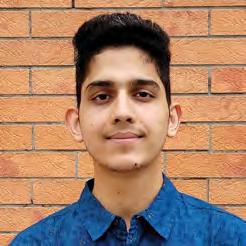
Jitender Swami CASI/DevLab Research Coordinator
For the first time, CASI has partnered across campus to create a predoctoral research fellowship to mentor first-generation students from India. In 2023, the first predoctoral fellow, Jitender Swami was hired in collaboration with DevLab@Penn.
Before coming to Penn, Jitender Swami worked as an Academic (Research & Teaching) Associate at the Indian Institute of Management Amritsar in the Department of Economics. Previously, he was a Writing Urban India Fellow at the Centre for Policy Research, India, and a Research Intern at Hyderabad Urban Lab.
Jitender has a Masters in Development Studies from the Indian Institute of Technology Hyderabad and a Bachelors in Economics from the Central University of Karnataka. His interests lie in engaging with and contributing to academic research, especially the kind that strongly influences development policy and improves individual and collective human experiences.
Postdoctoral Research Fellowship Program Summary:
CASI HAS SUPPORTED 14
YOUNG SCHOLARS SINCE 2010 12
HOLD ACADEMIC POSITIONS, TENURE TRACK AND TENURED, IN INDIA, THE U.K., AND THE U.S. 3 PUBLISHED PIECES BY CASI POSTDOCS INCLUDING A PEERREVIEWED ARTICLE, A BOOK CHAPTER, AND A COMMENTARY PIECE
CASI encourages and supports Penn graduate and undergraduate student engagement with India. We provide fellowships and grants for students conducting research on India and fullyfunded summer internship opportunities with internationally renowned partners.


OUR STUDENTS HAVE HAILED FROM 22
COUNTRIES AND 6 CONTINENTS 263
STUDENTS SUPPORTED SINCE 2007, REPRESENTING 11 OF 12 SCHOOLS AT PENN
17
ORGANIZATIONS HAVE HOSTED PENN STUDENTS AS INTERNS THROUGH CASI SINCE 2007
1000+ BLOG ENTRIES
These talented Penn students embark on internships in India, tackling diverse challenges across different sectors such as public health, environment and sustainability, education, gender, and social enterprise. The CASI Summer Internship allows students to gain invaluable on-the-ground experience and foster deep crosscultural understanding.
2024 CASI Summer Interns
PUBLIC HEALTH FOUNDATION OF INDIA (PHFI): GURGAON, HARYANA
Jaymaba Ndiaye College’25, Health and Society
Shristi Mapchan College’25 Psychology, Minor in Medical Sociology and Chemistry
Siddiqa Faruki Nursing’26, Global Health
ARAVIND EYE CARE SYSTEM: MADURAI AND PONDICHERRY
Amanda Kossoff Vagelos Life Sciences & Management Dual-Degree Program’27, Economics & Biology
Asanti Mergiya Vagelos Life Sciences & Management Dual-Degree Program’26 Healthcare Management & Policy and Biology
Alicia Zhang College’27, Computational Biology
Hana Matsuda Engineering’25, Bioengineering
Nitin Seshadri College’25, Neuroscience
Shivek Narang College’25, Neuroscience and Cognitive Science
SHAHI EXPORTS: BENGALURU
Bedansh Pandey College’26, International Relations
Iniyaal Raguraj College’26, Political Science and Computer Science

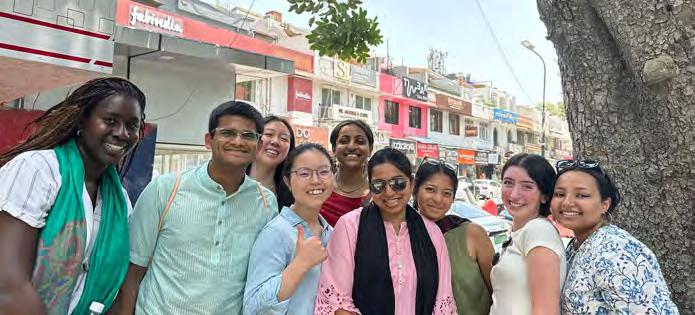
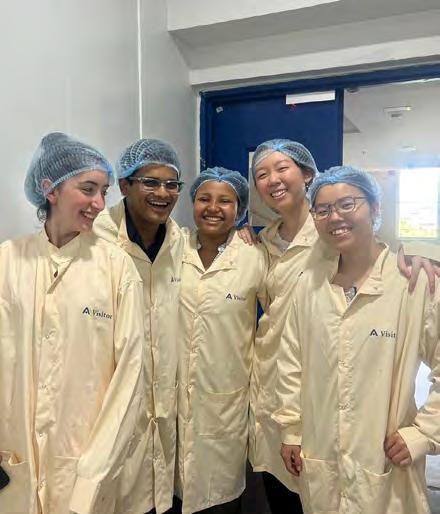
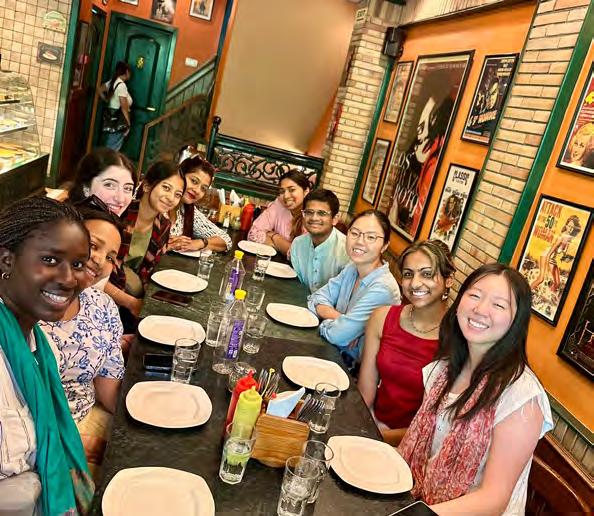

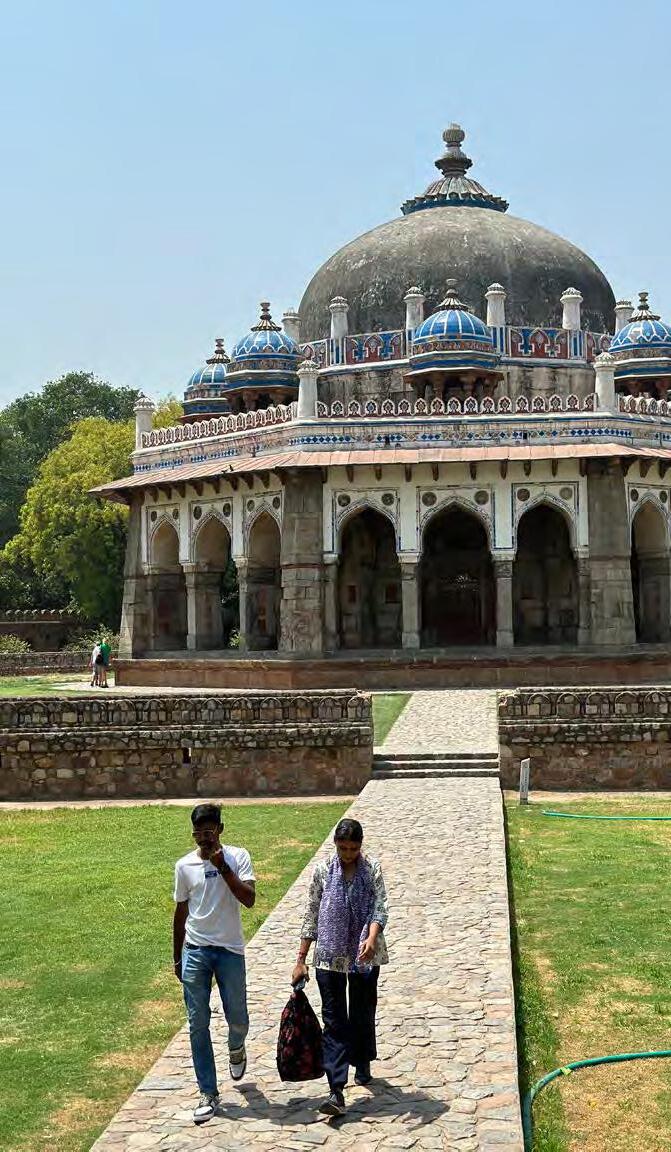
CASI aims to nurture a new generation of scholars in the study of contemporary India. In line with CASI’s vision, Penn Parents Rajiv Sobti GR’84 and Slomi Sobti created the Sobti Family Fellowships to support University of Pennsylvania graduate students in their research related to India’s current politics, society, economy, and international relations.
The Sobti Family Fellowship provides Penn doctoral students with $12,500 to develop independent research interests broadly related to CASI’s agenda. The award includes an unrestricted $10,000 grant with the addition of up to $2,500 in travel expenses, conference attendance fees, and research materials. Sobti Family Fellows are inresidence at CASI for their fellowship year and are invited to partake in seminars, events, and other CASI activities throughout the year.
The Sobti Fieldwork Fellowship provides Penn doctoral students funding ranging from $5,000 to $10,000 to develop independent research interests broadly related to CASI’s agenda. This fellowship is intended for conducting dissertation fieldwork during the academic year.
Six current and former Sobti Family Fellows have advanced their academic careers or completed earned their doctoral degrees this year:
- Apurva Bamezai Gr’25 (Sobti Fellow 2020–2021) will begin a postdoctoral fellowship in the Department of Political Science at Notre Dame and accepted a tenure-track assistant professorship in the Department of Political Science at Ashoka University to commence after completing her Notre Dame appointment.
- Kim Fernandes Gr’24 GES’24 (Sobti Fellow 2022–23) will complete a postdoctoral fellowship at University of Toronto this year and will begin a tenure track assistant professorship in the Department of Anthropology at Brown University this fall.
- Sneha Sarah Mani Gr’23 (Sobti Fellow 2021–2022), is a postdoctoral fellow at the Center on Aging and Health, Johns Hopkins University.
- Raka Sen Gr’24, (Sobti Fellow 2023–2024) completed her first year as an assistant professor of Sociology, at Arizona State University.
- Kimberly Noronha PennDesign’25 (Sobti Fellow 2021–2022) earned her doctorate in City and Regional Planning this month; and she will be a Postdoctoral Research Fellow at PennDesign.
- Advait Rajagopal Aiyar WG’25 (Sobti Fellow 2024–2025) earned his doctorate in Applied Economics.
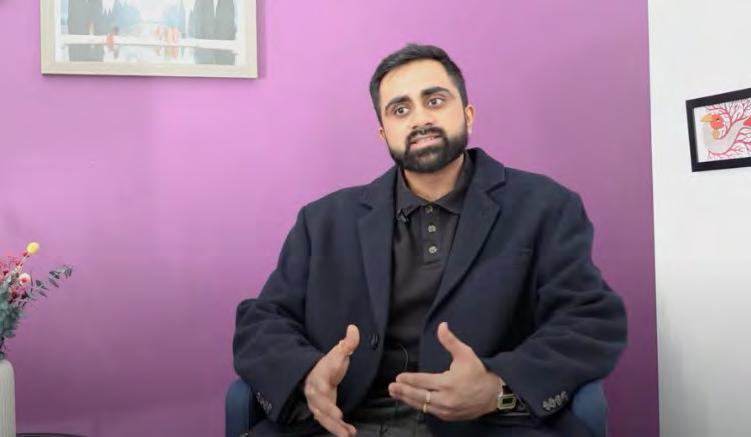


Ngamlienlal Kipgen
2024–25 Sobti Fieldwork Fellow
Doctoral Candidate, History and Sociology of Science
Wartime bodies in Frontier lands: Racializing American medicine in colonial India during WWII
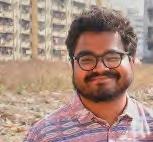
Adwaita Banerjee
2024–25 Sobti Fieldwork Fellow
Doctoral Candidate, Anthropology
Plastics in the Wild
Advait Rajagopal Aiyer WG’25 2024–25 Sobti Family Fellow Applied Economics
Watch his interview here:

Deepaboli Chatterjee 2024–25 Sobti Family Fellow Doctoral Candidate in Political Science
Watch her interview here:

These students undertake innovative research projects in India, supported by CASI. Their work spans a diverse range of topics ranging from politics, community formation, food and agriculture, literature, healthcare, and economic development.
Tanya Vaidya
SAS, Ph.D. Candidate in Political Science The Contractualization of the “Sarkari Naukri”
Sage Leland College’26, Neuroscience
A Study of Patient Digital Usage Habits, Access, and Attitudes at a High-volume Eye Hospital in Southern India
Norah Rami College’26, English Literary Freedom and Political Dialogue on Kolkata’s College Street
Kshama Mumbai College‘26, Economics Effect of Dissent within RBI on Financial Markets
Koyna Tomar
SAS, Ph.D. Candidate in History and Sociology of Science Dairy Democracy: Food and Techno-politics in Modern India, c.1880-1989
Kamalini Hegde
SAS, Joint Ph.D. Candidate South Asia Studies and Anthropology Mapping Agricultural Cooperatives in Karnataka: A Preliminary Exploration
Christopher LaMack
SAS, Ph.D. Candidate in Anthropology An Investigation of Small Industry in Colonial Bellary District, 1800-1947
Rushnae Kabir
SAS, Ph.D. Candidate in Department of Religious Studies Popular Islam in India: Love, Gender and Community Formation
CASI supports graduate and undergraduate students with Research Assistant opportunities throughout the year. This allows Penn students an intimate, hands-on experience in the world of academic research and broadens their perspectives on contemporary India. Many students use this experience as a launching point to begin conducting their own research in India.
Undergraduate Research Assistants
Manya Gupta C’25
Comparative Politics and Economics (undergraduate part-time student staff since September 2022, and CASI-Aravind Summer 2022 alumna).
Norah Rami C’26
English (undergraduate part-time student staff since April 2025, and Summer 2024 CASI Travels Funds for Research in India awardee)
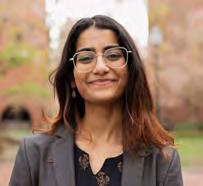
2024-25
Student Group
Collaborations
Across Campus:
CASI Research Assistant and Summer 2022 intern Manya Gupta, C‘25, Political Science and Economics, was one of two co-winners of the Leo S. Rowe Prize for best Political Science thesis submitted on a topic related to comparative politics and/or international relations. She also won the annual Holden Furber Prize (designed to promote and recognize excellence in undergraduate research as it relates to South Asia) for her senior thesis “Hidden Ingredients: Examining the Influence of Gender and Culture in Adopting Clean Cooking Fuels in India.” A Penn World Scholar, Manya additionally received the undergraduate First Honorable Mention for the 2025 ISSS Penn Global Student Citizenship Award








Throughout the year, CASI hosts academic seminars and special lectures on Penn’s campus and beyond. We generate opportunities for students, faculty, and the Penn community to engage in thoughtful discussion with scholars and thought-leaders focused on contemporary India. This past year featured an array of interdisciplinary talks on campus and highprofile guests including Dr. Gagandeep Kang, one of India’s leading virologists currently at the Bill & Melinda Gates Foundation, and Classical Hindustani Vocalist and Padma Shri awardee, Shubha Mudgal.
CASI continued its long-running online publication, India in Transition (IiT ), now in its 19th year, which presents brief, analytical perspectives to a wide and diverse audience on innovative ideas and ongoing transformations in contemporary India.
This academic year, IiT added a new feature into its permanent rotation: CASI Deep Dive Interviews, which are published every 4–6 weeks in the IiT publication schedule. Conducted by CASI Managing Editor, Rohan Venkat, these longform interviews feature scholars, journalists, and artists who share their life’s work, passions, and research on a range of topics.
Finally, this academic year also saw the launch of a fresh re-design of the Center’s website.

31 EVENTS 22 CROSS-CAMPUS COLLABORATORS
30
INDIA IN TRANSITION ARTICLES PUBLISHED
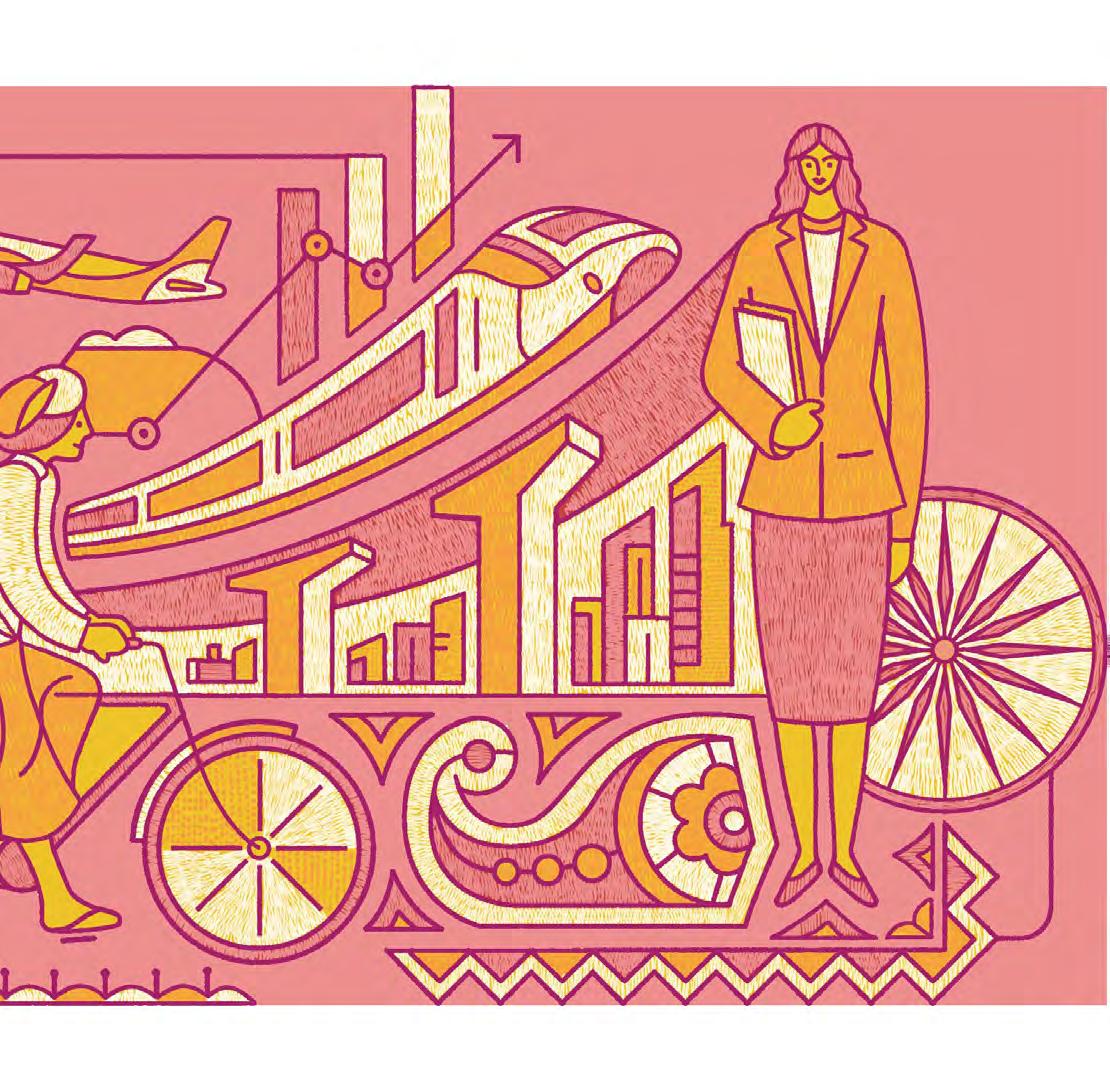
DEEP DIVE INTERVIEWS
Our robust schedule of interdisciplinary events has included 31 talks by scholars from 10 different disciplines. Our academic seminar series has consistently increased turnout, which is now 40% higher than pre-pandemic levels. Each event hosts at least one co-sponsoring partner, an increase from 16 last year which speaks to the deepening collaborations CASI has pursued across Penn’s campus the past several years.
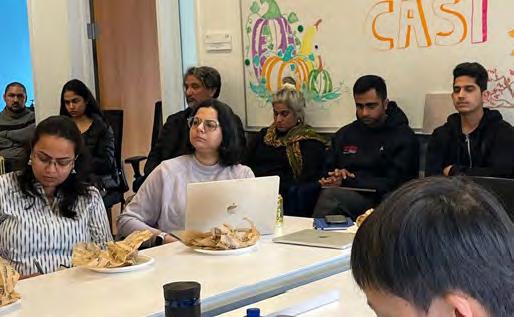
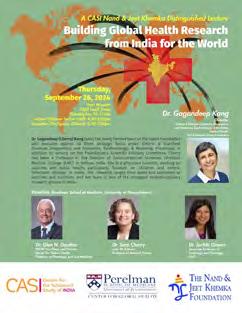
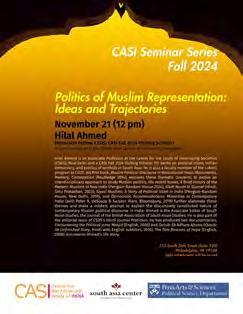

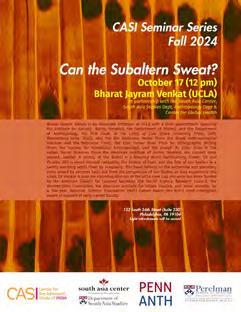
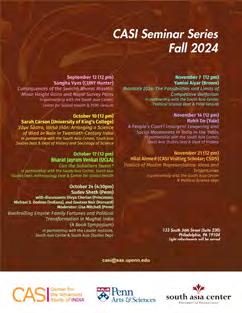
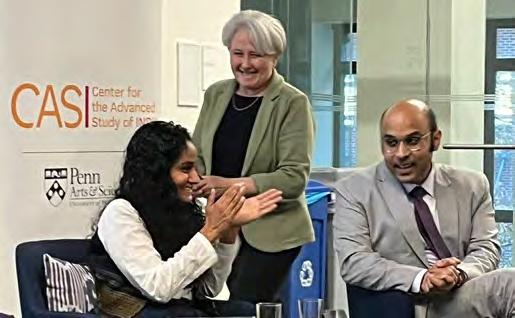
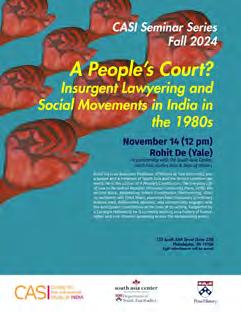

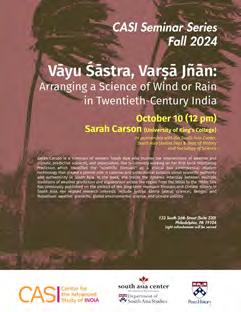
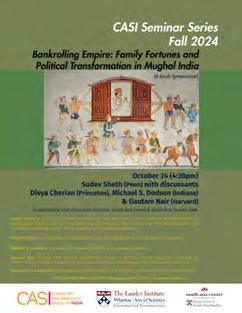
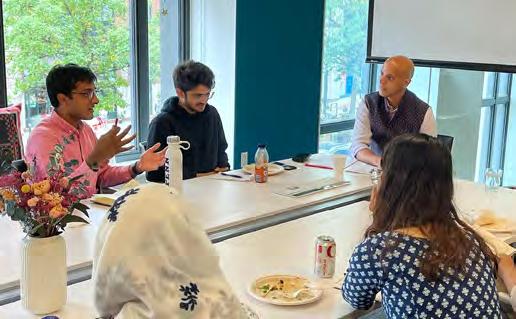
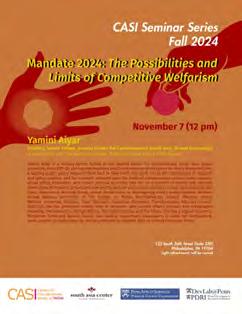
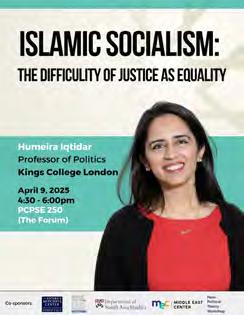
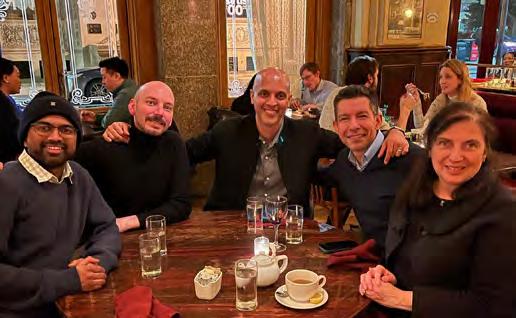
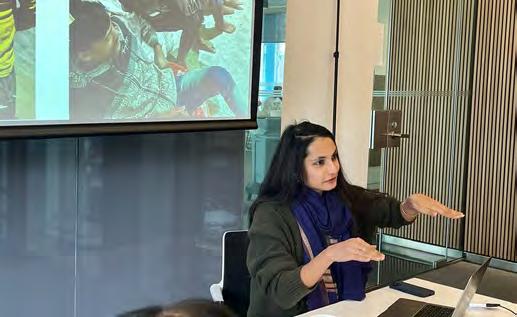

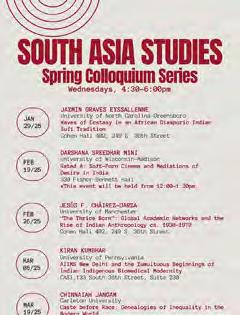
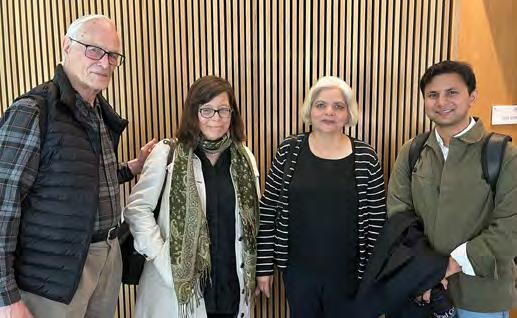
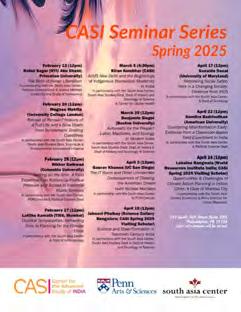
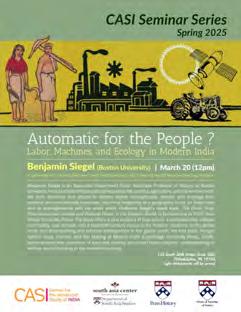
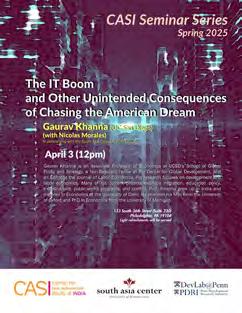
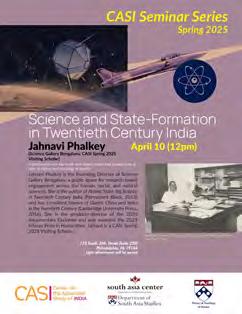
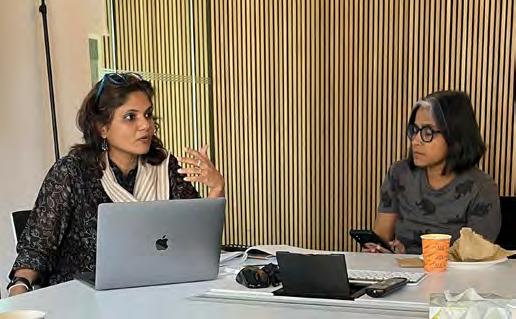
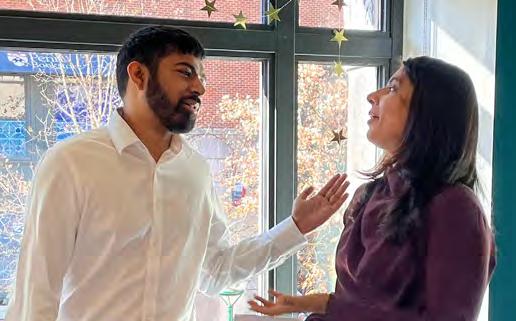
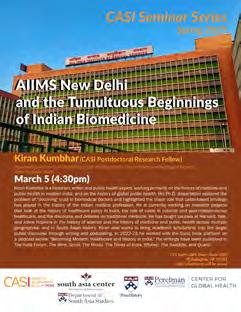
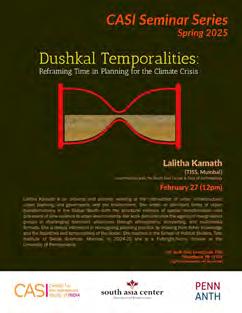
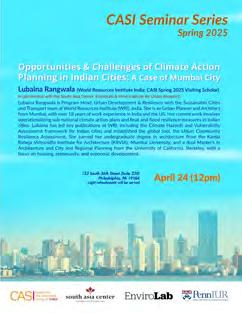
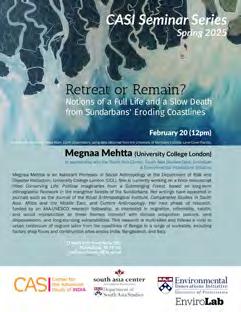
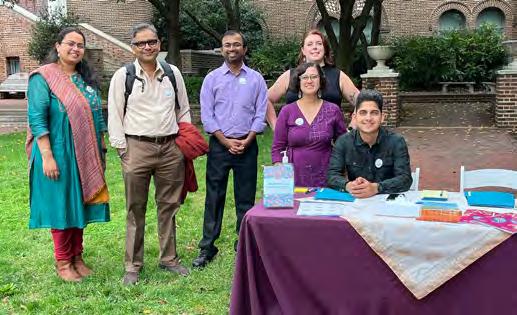
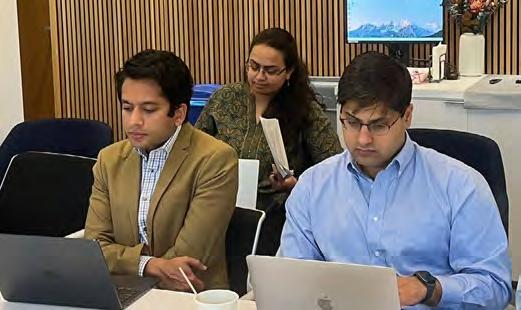
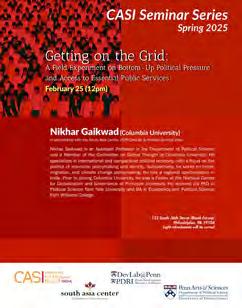
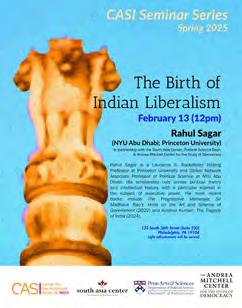
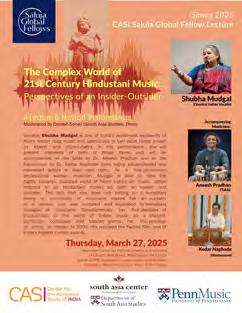
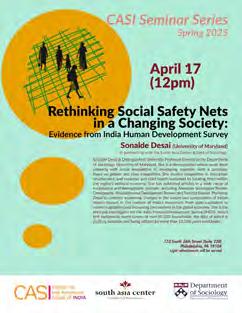
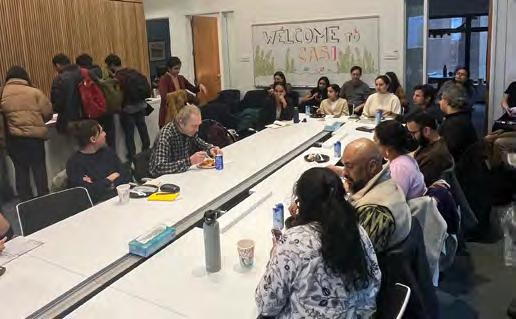
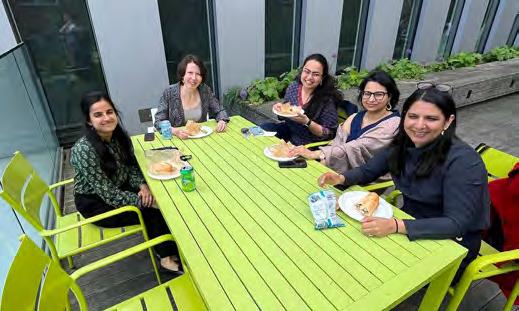
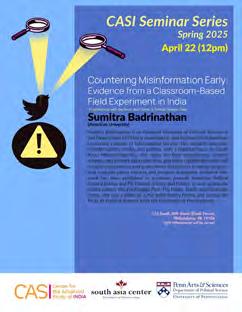
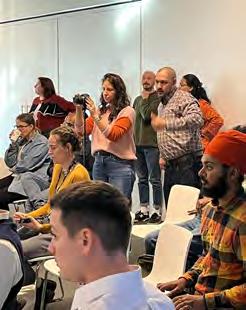
Annenberg School for Communication
Comparative Politics Workshop
Department of Anthropology
Department of Cinema & Media Studies
Department of Economics
Department of History
Department of Political Science
Department of South Asia Studies
EnviroLab
Kelly Writers House
Legal History Workshop
PDRI-DevLab
Penn Anthropology Colloquium
Penn Law
Pop Studies
South Asia Center
Fall 2024
NAND & JEET KHEMKA
DISTINGUISHED LECTURE SERIES
Dr. Gagandeep Kang
Director, Enteric & Diarrheal Diseases, Diagnostics, and Genomics, Epidemiology, & Modeling, Global Health, the Bill & Melinda Gates Foundation
In partnership with the Center for Global Health, Perelman School of Medicine, Penn
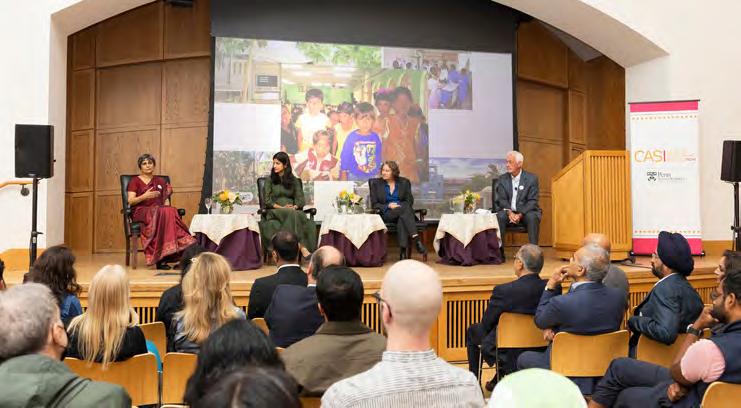

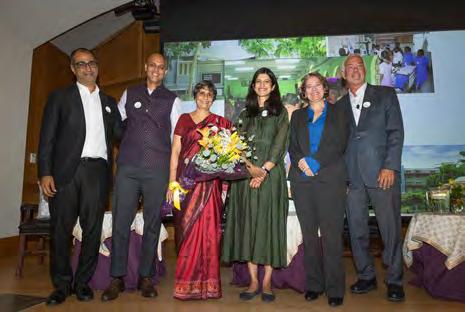
The Complex World of 21st Century Hindustani Music: Perspectives of an Insider-Outsider
Shubha Mudgal, Aneesh Pradhan, and Kedar Naphade Moderated by Davesh Soneji (South Asia Studies, Penn), in partnership with the South Asia Center, Dept. of South Asia Studies, and Penn Music


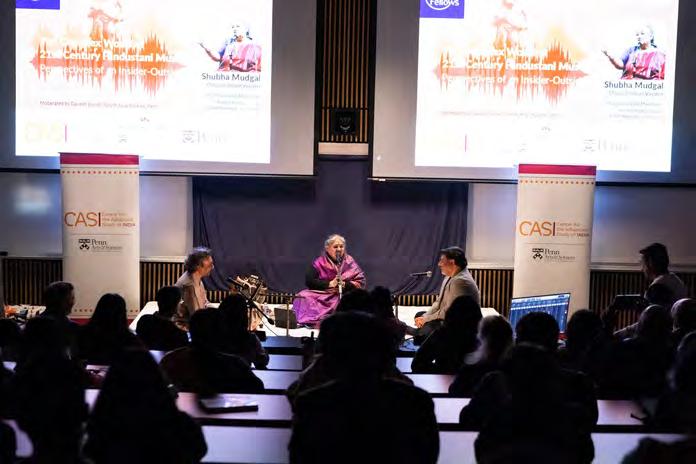
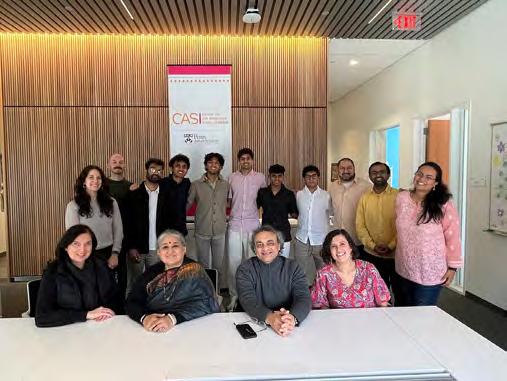
India in Transition (IiT ) presents brief, analytical perspectives to a wide and diverse audience on innovative ideas and ongoing transformations in contemporary India.
In 2024–25, IiT featured 30 articles published in English, Hindi, Bangla, and Tamil. CASI continues its strong partnership with Indian news outlet Scroll.in, the largest digital English news media outlet in India, with a readership of 7–9 million per month to syndicate all IiT articles. This collaboration has significantly expanded IiT’s digital footprint.
For a complete list of the 2024–25 India in Transition articles and to read in Hindi, Bangla or Tamil, please refer to the IiT homepage on the CASI site.

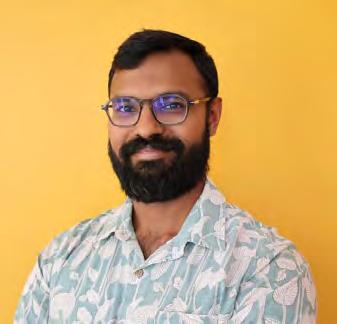
Series:




In FY25, India in Transition (IiT ) introduced a new feature into its permanent rotation: CASI Deep Dive Interviews. These longform interviews feature scholars, journalists, and artists who share their life’s work, passions, and research on a range of topics. Conducted by CASI Managing Editor, Rohan Venkat, Deep Dives are published as transcribed text every 4-6 weeks in the IiT publication schedule. Future plans include featuring audio of the interviews in addition to text.
Swapna Kona Nayudu on Non-Alignment as Civil Disobedience and Nehru’s Blind Spots
June 23, 2025
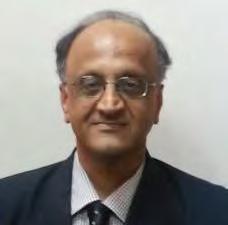
Tariq Thachil on CASI and the Complex Challenge of Studying India in the United States
May 28,2025

Avinash Paliwal on India’s “Near East” and How History is Rhyming in Bangladesh
March 31, 2025

Urmilla Deshpande and Thiago Pinto Barbosa on the Complex Legacy of Pioneering Indian Scholar Irawati Karve
February 3, 2025
Eswaran Sridharan on the 2024 Elections and India’s Unique Coalition Politics
December 23, 2024
Joshua Ehrlich on the East India Company, Big Tech, and How Corporations Think About Knowledge
November 25, 2024
Gagandeep Kang on “Unglamorous Diseases,” Global Health, and Lessons from the Indian Experience
October 14, 2024
This coming year will be one of major transition for CASI as we bid a fond farewell to our Director, Tariq Thachil, whose leadership and guidance has grown and expanded CASI to many new heights over the past five years. We are grateful our Associate Faculty Director, Nikhil Anand will serve as Interim Director for the 2025–26 academic year prior to the introduction of our new permanent Director in July 2026.
We’re pleased to welcome six in-residence Visiting Scholars & Fellows during the academic year, as well as a new Climate Postdoctoral Fellow in the Fall—an anthropologist specializing in how climate precarities and environmental dispossession intersect with labor and political belonging. India in Transition (IiT ) our multilingual publication, has expanded its platform with the introduction of CASI Deep Dive Interviews into its permanent rotation; longform interviews featuring scholars, journalists, and artists who share their life’s work, passions, and research on a range of topics. This next year will see IiT expand even further with the launch of a series of podcast episodes in conjunction with Himal Southasian. CASI Student Programs added a new internship partner SM Sehgal Foundation (Gurgaon, Haryana), whose mission is a commitment to positive social, economic, and environmental change across rural India.
Our annual Khemka Distinguished Lecture will be held on campus this Fall, featuring a talk by Princeton University’s Navroz K. Dubash on the intertwining of climate and development in India. In addition to our slate of in-campus seminars and events covering a wide range of topics, we will co-organize and host a climate workshop in Spring 2026 with one of our former postdocs—further strengthening CASI’s portfolio on climate and environmental policy.
With these endeavors, CASI continues its commitment to expanding its footprint in critical areas of research, outreach, and educational opportunities that hopefully lead to growth in policy, public health, and political representation.
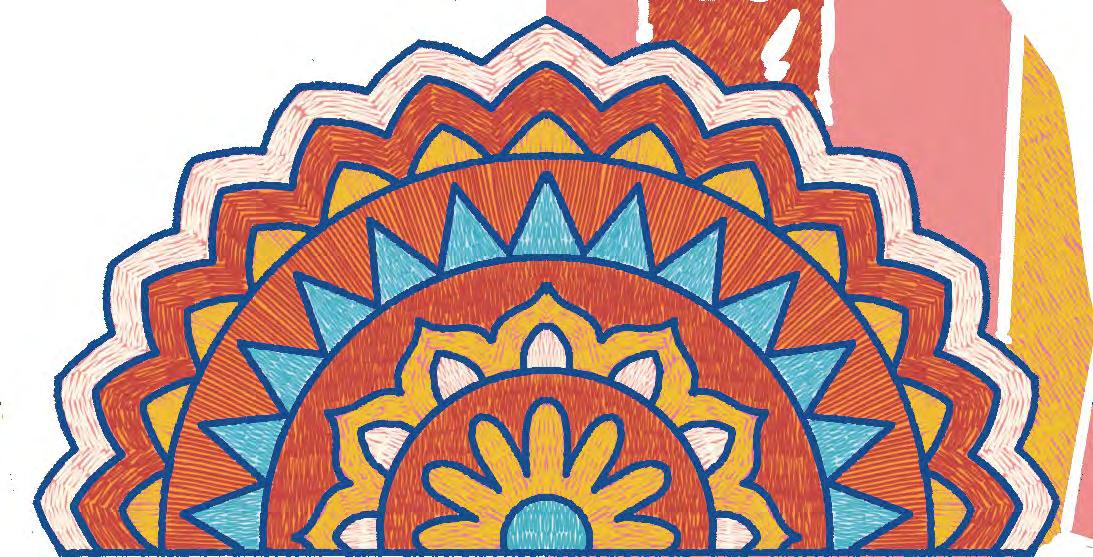
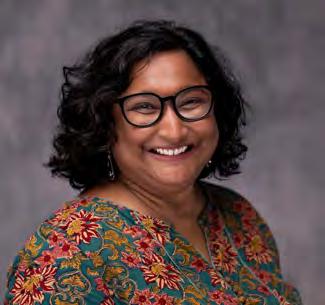
Sita Mamidipudi Ph.D. Anthropology, UCLA (2025)
Sita Mamidipudi is an environmental anthropologist interested in the intersection of climate precarities, environmental dispossession, and property relations in India. Her research is based in the Little Rann of Kutch, a region along the Western coast of India usually flooded by rainwater and the sea during the four months of the monsoon, and a saline desert for the rest of the year as the water recedes. Sita has a PhD in Anthropology from the University of California, Los Angeles (UCLA). As a Climate Postdoctoral Research Fellow at CASI, Sita is working on furthering her dissertation research, while also contributing to Nikhil Anand’s project “Stories of Climate Action: Negotiating Planning in Mumbai’s Wetscapes.” Sita is teaching an undergraduate seminar in environmental anthropology at Penn Anthropology, and has taught her own courses in anthropology, development studies, and communitybased research methods at UCLA. She has also worked as an educator and researcher in India at the Tata Institute of Social Sciences and at ANANDI India, with publications in the fields of environmental anthropology, land rights, sexual violence, access to healthcare, and feminist solidarities.
Pramit Bhattacharya
Head of Research, Data for India
September 2–October 31, 2025
Vaishnavi Chandrashekhar
Freelance Journalist & Editor
September 2–October 31, 2025
Harsh Nisar
Advisor, National Highways Authority of India
October 1–November 30, 2025
Raju Chalwadi
IIT-Bombay
January 15–April 15, 2026
Nityanand Jayaraman
Writer and Researcher
February 11–April 10, 2026
Radhika Khosla
Research Director, Oxford India Centre for Sustainable Development
April 2026
September 25, 2025
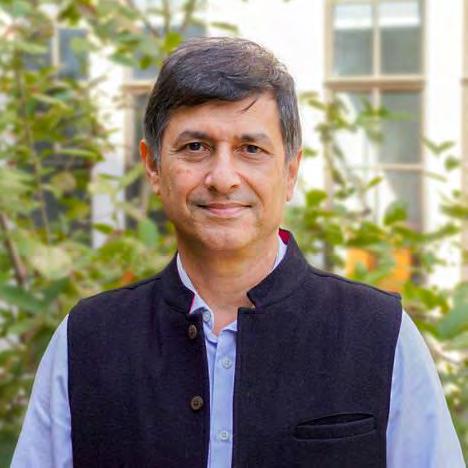
Navroz K. Dubash
Professor of Public and International Affairs and the High Meadow Environmental Institute, Princeton University
Navroz K. Dubash is a Professor of Public and International Affairs and the High Meadows Environmental Institute at Princeton University. His work explores emergent patterns of climate governance suitable to meet the twin challenges of the climate crisis and unmet development aspirations. Prior to Princeton, he spent fifteen years at the Centre for Policy Research in New Delhi. He is currently co-Editor in Chief of Climate Policy and has published widely on national climate policy, international cooperation, energy transitions, and air quality. Dubash has served on the Intergovernmental Panel on Climate Change (IPCC), most recently as Coordinating Lead Author for the Sixth Assessment Report, and as a member of the steering committee for the UNEP Emissions Gap Report. He has advised the Government of India over the last decade as a member of advisory committees on climate change, energy, and air and water policy, and coordinated a team to draft India’s Long-Term Low Emissions Development Strategy.
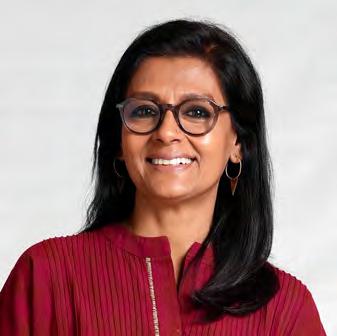
Nandita Das Actor, Filmmaker, Social Advocate
Nandita Das has acted in more than 40 feature films in 10 different languages. Her directorial debut Firaaq (2008) premiered at Toronto International Film Festival (TIFF) and garnered many accolades and critical appreciation, both in India and abroad. In 2011, she was conferred the “Knight of the Order of Arts and Letters” by the French Government. Her second directorial feature Manto, based on the life and works of writer Saadat Hasan Manto, premiered at the Cannes Film Festival in 2018. Her first book, Manto & I, chronicles her 6-yearlong journey of making the film. In 2016, she founded Nandita Das Initiatives (NDI), a creative platform which produced her feature films Manto and Zwigato, her third directorial film which explores the struggles of a food delivery rider and his family. It premiered at TIFF and after its theatrical release, it is streaming on Amazon Prime. She wrote, directed and produced shorts such as Listen to Her, that sheds light on important social issues. Nandita has a Master’s degree in Social Work and is a strong advocate of human rights and social justice.
The University of Pennsylvania Institute for the Advanced Study of India (UPIASI) was established in 1997 as CASI’s counterpart institution in India to ensure a stronger network for collaborative research and scholarship. Under the leadership of Dr. Eswaran Sridharan, UPIASI has developed a strong research program of its own besides facilitating CASI and wider Penn research on India and is increasingly playing a role in a range of Penn related initiatives in India such as faculty research, global immersion programs, student internships and exchanges as well as orientations of newly admitted students from India.
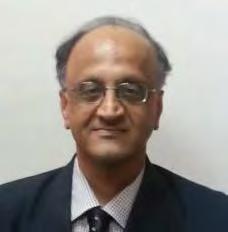
Eswaran Sridharan Director and Chief Executive Officer UPIASI
We aim to facilitate research that fosters greater understanding of problems facing contemporary India especially in areas of politics and governance, international relations and foreign policy, economic development & contemporary social change and more recently energy and environment. Based in New Delhi, the Institute acts as a catalyst for building strong networks of collaborative research and scholarship for the mutual benefit of Penn and Indian academic communities.
UPIASI currently works with a number of Penn schools and departments, including the School of Arts and Sciences, Penn Global, Penn Alumni Relations, and Penn’s Alumni Interview Program. UPIASI also works closely with alumni groups in India, including the five Penn Clubs and the four Alumni Interview Committees.
This past year has been an extremely fruitful year at UPIASI. In the backdrop of a challenging geopolitical landscape UPIASI published three new books:
1. Eswaran Sridharn, Indian Politics and International Relations: Underexplored Issues and Approaches (2025).
2. Sumit Ganguly and Eswaran Sridharan, eds., The Oxford Handbook of Indian Politics, (2024).
3. Eswaran Sridharan, Elections, Parties and Coalitions: Theory and Recent History (2024), which went into paperback and Kindle editions.
UPIASI also started a new Faculty Talk Series showcasing Penn Faculty that hosted its first two events with Sudev Sheth , Penn faculty in History at the Lauder Institute, and John Lapinski , Professor of Political Science. Further 5 new academic papers have been published under the UPIASI Knowledge Series, thanks to the generous support of Penn Alumnus Gaurav Motwane. The Series consists of a curated set of articles that not only examine key challenges facing India today but also propose actionable pathways toward sustainable development, tailored to the nation’s evolving needs.
In addition, UPIASI hosted 4 new webinars, the latest being The Future of Workforce and Employment in India , featuring Santosh Mehrotra, University of Bath, and Arun Kumar, Former Professor of Economics, Jawaharlal Nehru University. The webinar discussed the challenges and opportunities as we witness the return to agriculture-based jobs, continuing insecure employment through the gig economy and informal work, and the competitiveness inherent in skillbased employment shaping the workforce of tomorrow.
UPIASI also continued to grow the Postdoctoral Fellowship program this year with the continued support of Vayu Garware, Penn Alumnus and CASI’s International Advisory Board (IAB) member. The fellowship offers young scholars with recently completed Ph.D.s, an opportunity to pursue independent research projects on topics of contemporary India. For the 2024–25 period, we have recruited a new Postdoctoral Fellow, Aparna Pasumarthy, Ph.D. from Queen Mary University of London, who will be working on Professional Women’s Careers in India. Her project titled “In Pursuit of Sustainable Careers: Navigating Parenthood, Careers, and Life,” focuses on the challenges Indian working parents face in balancing careers and parenthood, especially in gendered workplaces and informal economies.
This summer, we once again collaborated with Penn Global’s Office of International Student and Scholar Services (ISSS) to organize the Penn Forerunner program in India. This event, aimed at newly admitted Penn international students introduces them to university resources and provides opportunities to connect with current students, alumni, staff, and faculty members.
UPIASI has been working on a crucial project titled “Hamaara Itihaas” (Our History), an Archive of Freedom Fighters. The Hamaara Itihaas Archive of Freedom Fighters was started by award-winning filmmaker Sagari Chhabra in 1995 and is ongoing. The project resulted in an exhibition at India International Center from August 9–23, 2025, which displayed the known and unknown freedom fighters who struggled for India’s independence across the world.
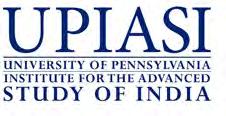
Nikhil Anand
CASI Associate Faculty Director, Daniel Braun Silvers and Robert Peter Silvers Family Presidential Professor of Anthropology
Alan Atchison Head of Communications
Juni Bahuguna Assistant Director, Student and Visitor Programs
Matt Barlow Climate Postdoctoral Research Fellow
Juliana Di Giustini Executive Director
Rachael Dougherty Administrative Coordinator
Kiran Kumbhar Postdoctoral Research Fellow
Georgette Rochlin
Deputy Director (as of October 2024, Senior Associate Director through September 2024)
Shahana Sheikh Postdoctoral Research Fellow
Tariq Thachil CASI Director, Professor of Political Science, Madan Lal Sobti Professor for the Study of Contemporary India, University of Pennsylvania
Rohan Venkat
Managing Director, India in Transition

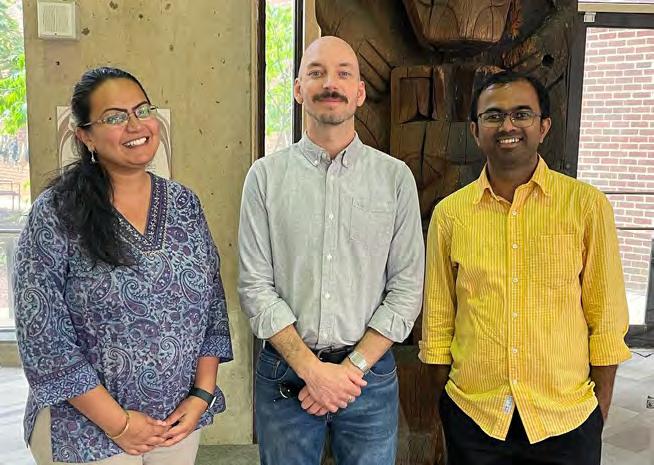
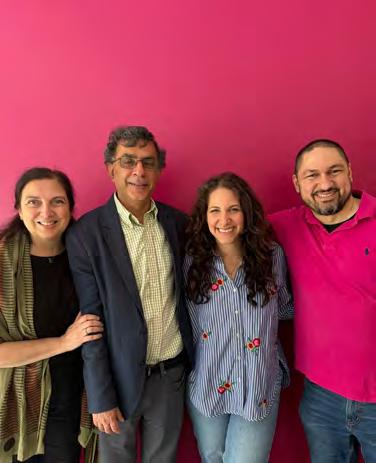
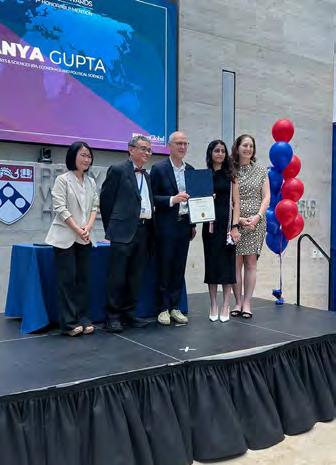
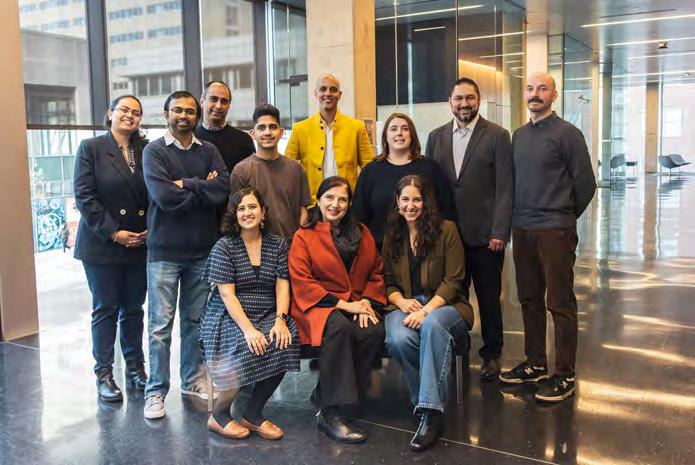
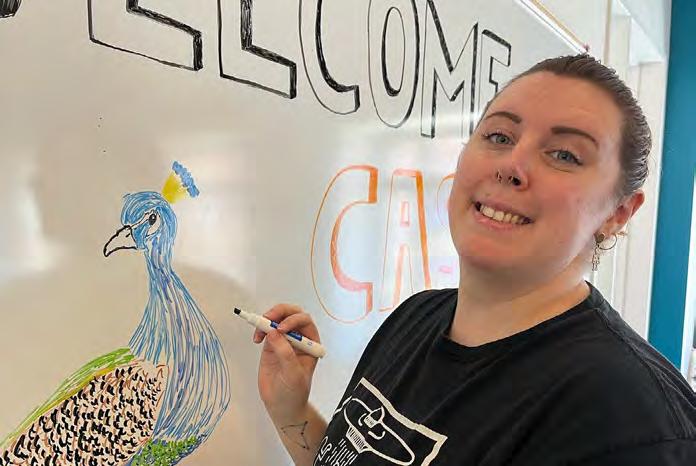
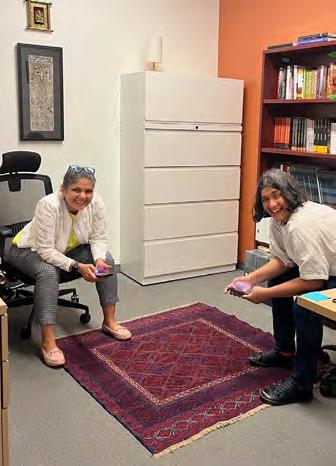
The Friends of CASI are individuals who, by their annual unrestricted financial support, demonstrate their dedication to the mission of the Center. As an integral part of the Center’s community, many members also contribute their time as advocates of CASI’s work. In appreciation, we encourage our Friends of CASI to take special advantage of the programs that their support sustains, including unique opportunities to engage with each other and special access to the work of the Center.
For more information about making a gift to CASI please contact Michael Baker, Senior Director of Global Operations, School of Arts and Sciences, University of Pennsylvania.

